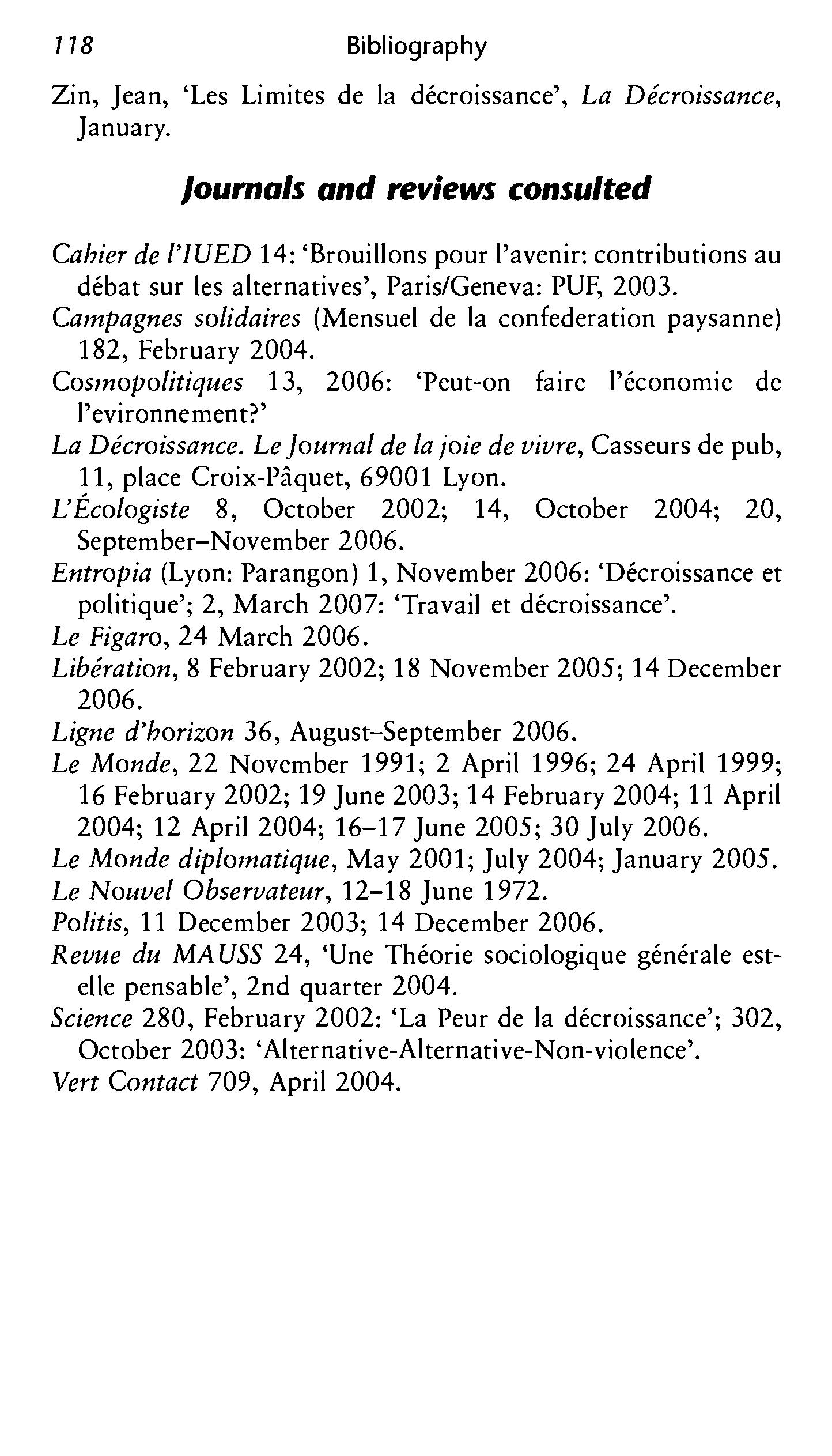
32 minute read
Do We Need a Dc-Growth Party?
Do We Need a De-G rowth Party?
'In the event of a world-wide ecological disaster, for example, one can easily imagine authoritarian regimes introducing draconian restrictions on a panicked and apa- thetic population. . . . And if there is no new movement and no reawakening of the democratic project, "ecology" could very well be integrated into a neo-fascist ideology' (Castoriadis 2005: 246). If we react to that terrifying pros- pect by gambling on de-growth, we must assume that the attractions of a convivial utopia, together with the need for change, will encourage a 'decolonization of the imagi- nary' and will do enough to encourage 'virtuous' behav- iours that will help us to find a reasonable solution. Castoriadis's analysis reaches the same conclusion: 'It is essential to insert the ecological component into a radical democratic political programme. And the imperative to do so is all the greater in that the challenge to the values and orientations of contemporary society, which is implicit in such a project, is indissociable from the critique of the imaginary of "development" on which we are living' (Castoriadis 2005: 246).
Does this necessarily mean that we now have to reify the movement in the form of a de-growth party? I think not. There is a danger that the premature institutionaliza- tion of the dc-growth programme in the form of a political party would lead us into the trap of mere politicking. When that happens, political actors become divorced from social realities and trapped within the political game. The preconditions that might allow us to dream of building a dc-growth society have yet to be established, and it is doubtful that such a society would be built within the outdated framework of the nation-state (see Fotopoulos 2001; Latouche 2005d). And yet politicking seems to exercise a growing seduction as its impotence becomes more and more pathetic, and candidates are queuing up
96
A Political Programme to capitalize as quickly as possible on the (very relative) success of this or that legitimate demand. I think, on the contrary, that it is more important to influence the debate, to persuade people to take certain arguments into consid- eration, and to help to change attitudes. That is now our mission and our ambition.
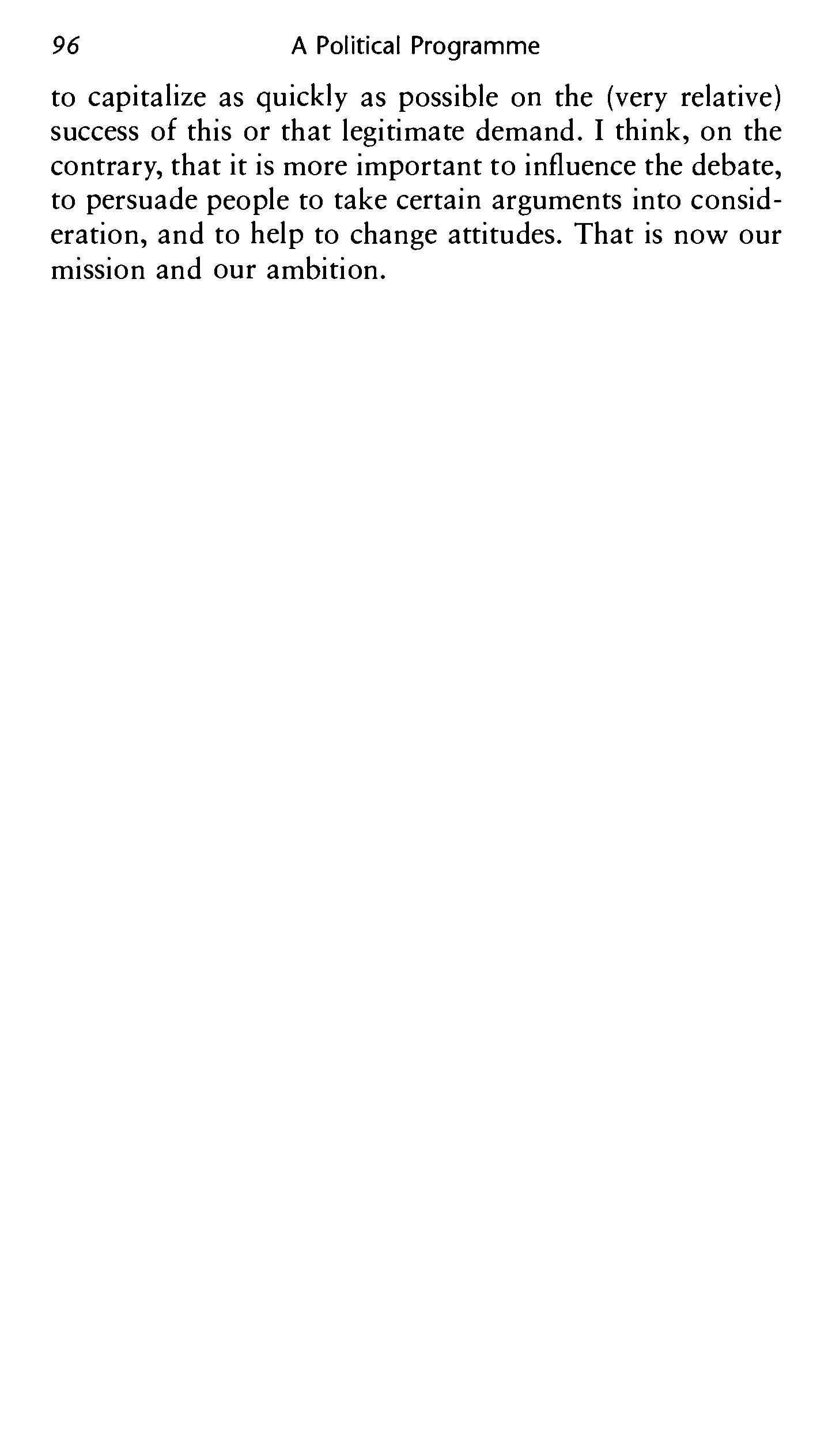
Conclusion
Is De-Growth a Humanism?
Have men gone mad? I think so, and I am becoming more and more convinced that they have. All this can and will lead only to our destruction. Unless
(Belpomme 2007: 56)
Like all ecologists, advocates of de-growth are suspected of rejecting the anthropocentrism of the Enlightenment tradition in favour of an unwavering ecocentrism and, therefore, of supporting a form of deep ecology that takes an 'anti-speciesist' stance. They are, in other words, sus- pected of seeing the survival of cockroaches as more important than that of human beings. Those who intro- duce a spiritual, or even religious, dimension are immedi- ately accused of ecolatry. Then comes the accusation that they are calling for a return to a local or closed commu- nitarianism. And then the invectives start: they are retro- grade, obscurantist and reactionary (see, for instance, Jacob 2006).
As they do not subscribe to a superficial view of ecology, the advocates of de-growth are supposedly believers in 'deep' ecology. Deep ecology, or at least the form of deep ecology popularized by Arne Naess, does, perhaps, go too far in the direction of ecocentrism, but many of those who
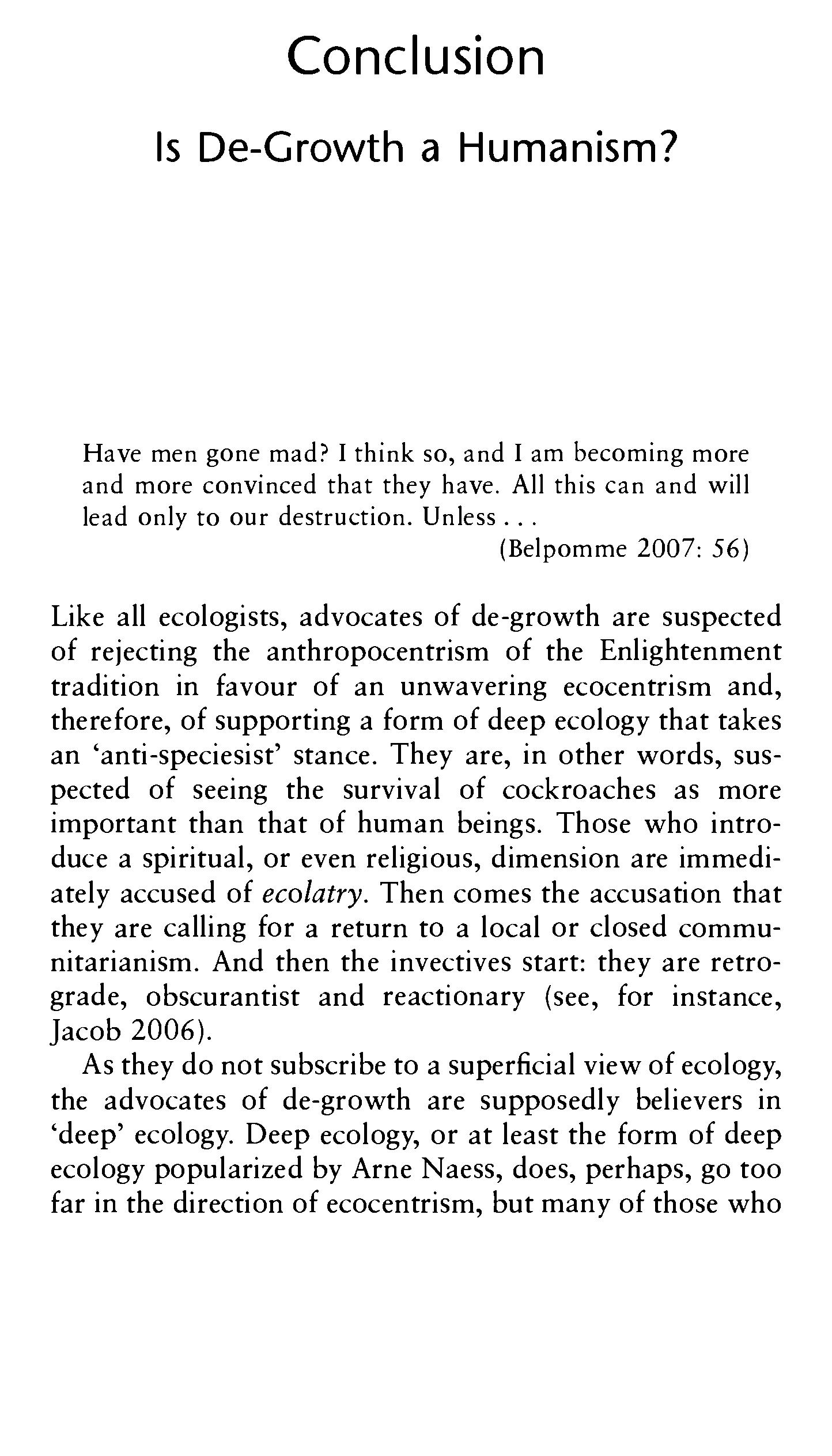
argue the case against continued growth claim to be humanists. This issue is surrounded by a lot of confusion, and the tendency to argue in Manichaean terms does little to dispel it.1 Do we really have to choose between ecocentrism and anthropocentrism, humanism and anti- speciesism, absolute relativism and dogmatic universalism, and modernity and tradition? How can we get away from these old debates, which are interconnected and recurrent, and which, ultimately, can never be decided one way or the other? Does rejecting the humanism of George W. Bush, the anthropocentrism of Descartes, Bacon and Teilhard de Chardin and the racist universalism of Kant2 necessarily mean that we have to reject human specificity, fail to recognize human dignity and trap ourselves into cultural ghettoes?
We must, first of all, be agreed as to what humanism is. It is basically the belief that the concept of a 'human being' implies an essential/substantial essence that transcends the mere existence of the species. The humanity of human beings, in other words, exists independently of the con- crete existence of concrete human beings (past, present and future) as an 'abstraction' and not as a 'common denomi- nator'. The human essence derives, it is claimed, from something that makes humans radically different from other species. Some call it the soul, and others reason. That transcendence is not oniy immanent in the generality idea of 'man', but inscribed within a problematic conceptual
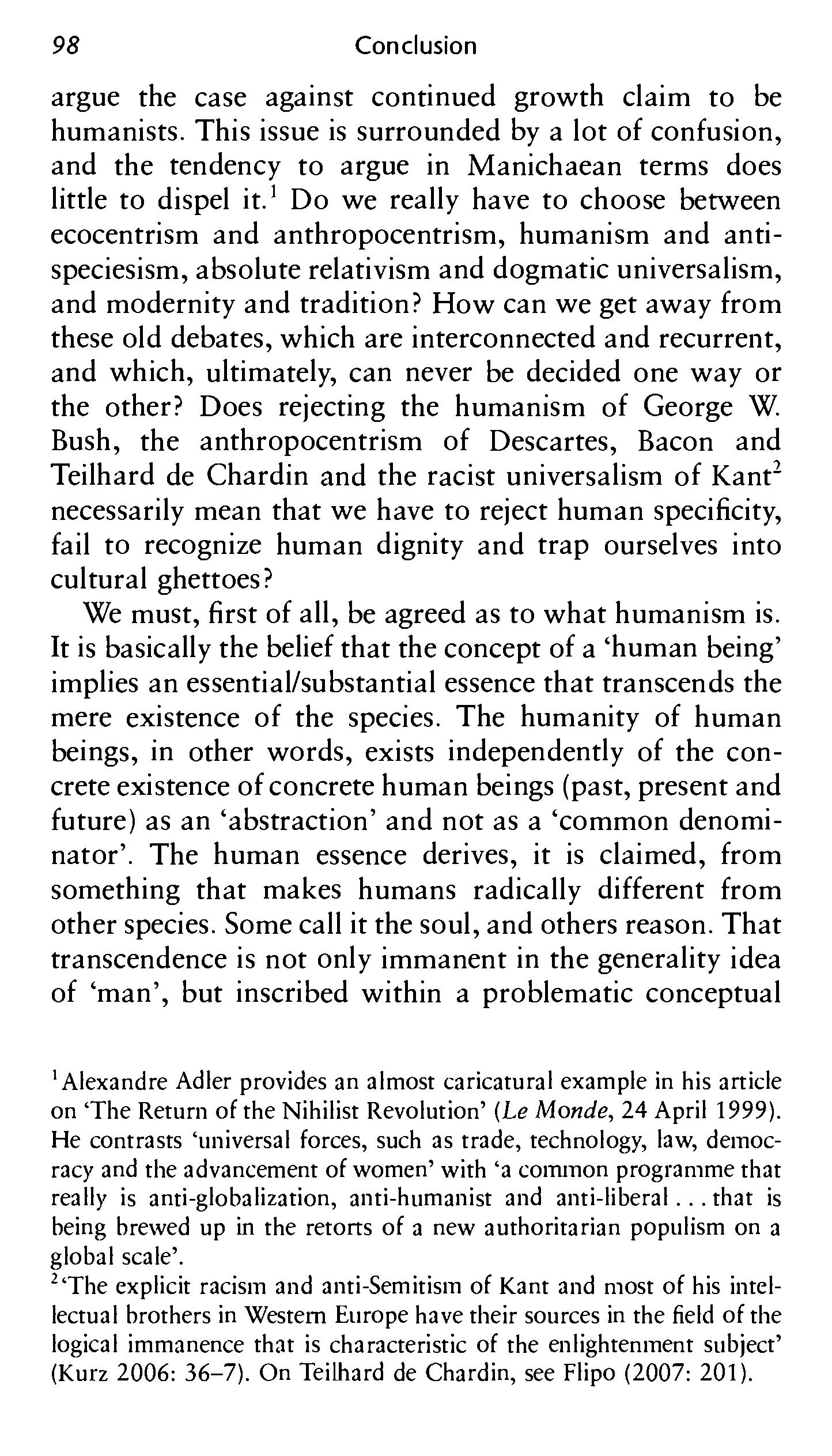
'Alexandre Adler provides an almost caricatural example in his article on 'The Return of the Nihilist Revolution' (Le Monde, 24 April 1999). He contrasts 'universal forces, such as trade, technology, law, democ- racy and the advancement of women' with 'a common programme that really is anti-globalization, anti-humanist and anti-liberal . . . that is being brewed up in the retorts of a new authoritarian populism on a global scale'. 2'The explicit racism and anti-Semitism of Kant and most of his intel- lectual brothers in Western Europe have their sources in the field of the logical immanence that is characteristic of the enlightenment subject' (Kurz 2006: 36-7). On Teilhard de Chardin, see Flipo (2007: 201).
eternity. Humans are therefore superior beings who have (natural) rights over other species and over nature. These are human rights or the rights of man. Hence the impor- tance of the sixteenth-century Valladolid controversy over whether or not Indians had souls (at the same time, the said Indians were leaving white prisoners to rot in water to see if they really were extraterritorial entities such as gods, ancestors or demons.. .). 'Humanism, which puts man at the centre of the universe, can be defined as an anthropocentrist particularism' (Kessous 2006: 54).
There is no doubt that this is true in the case of West- erners (and therefore in my own case, given that I am a Westerner). That is why we resist, and must resist, all forms of racism and discrimination (skin colour, sex, reli- gion, ethnicity. . .). Unfortunately, they are all too common in the West, even today. Think of Guantánamo Bay, Abu Ghraib, the Sarkozy laws or the wall along the USMexican border. The American legislation that legalized torture reached one of the most repulsive peaks of hypocrisy on the part of Christian humanists who claim to be the defend- ers of democracy and human rights. The problem is that, for very many cultures, the great divide between nature and culture simply does not exist. For the Asmat of Papua New Guinea, for instance, some 'animals' are undeniably part of the 'human' family, whilst members of the neigh- bouring tribe come in to the category of foodstuff! I am quite convinced that the Asmat are mistaken. The problem is that I can only prove to them that they are mistaken from within my own culture (the same applies to them, always assuming that they are interested in 'converting' me to the Asmat Weltanschauung). Does that give me the right to force my convictions on them?
In my view, de-growth, in the sense that it provides the philosophical foundations for a project for an autonomous society, is probably not a humanism because it is based upon a critique of development, growth, progress, technol- ogy and, ultimately, modernity and because it implies a break with Western centralism. It is no coincidence that
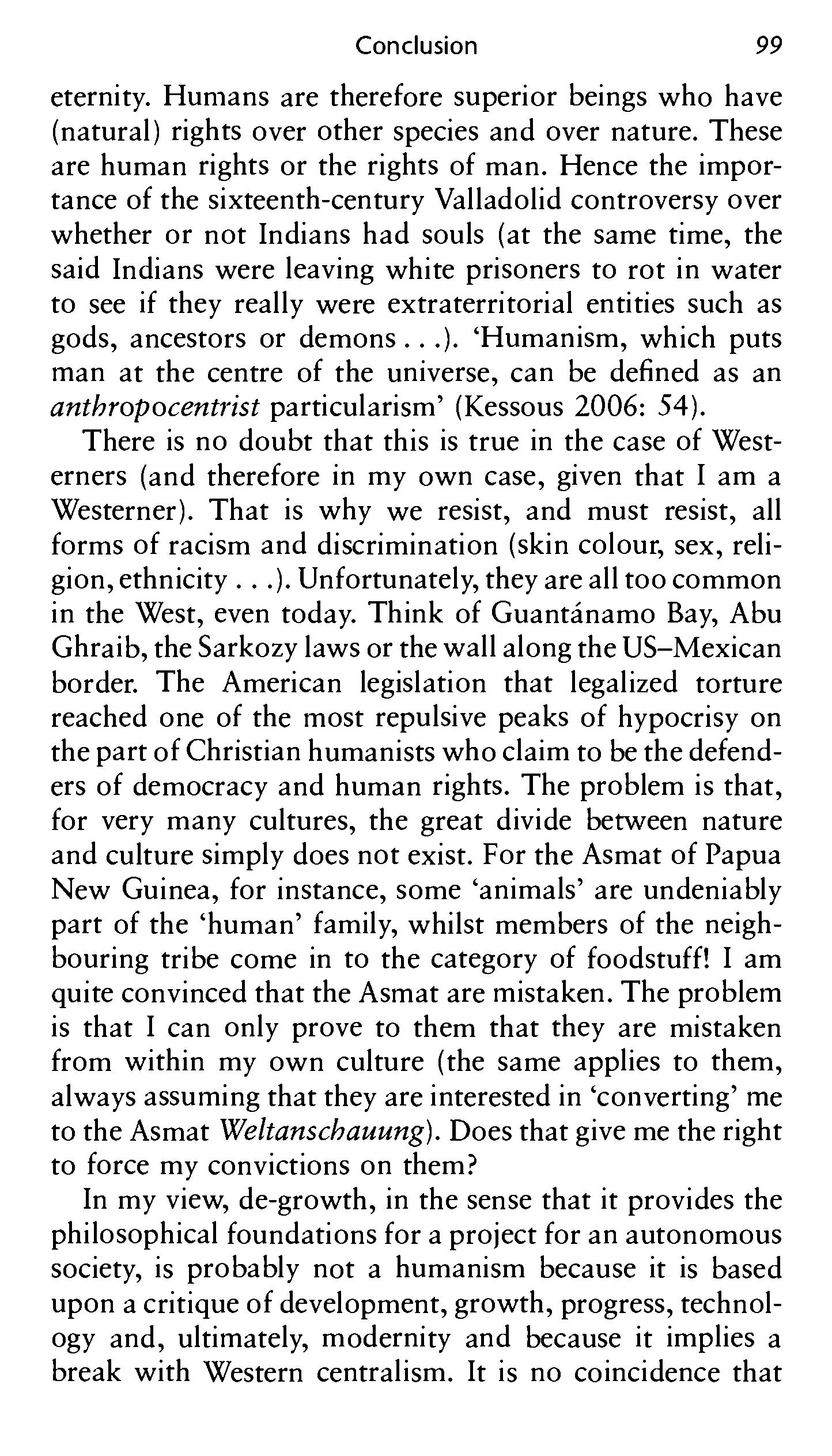
most of those who inspired de-growth (Illich, Ellul, but also Claude Lévi-Strauss, Robert Jaulin, Marshall Sahlins and many others) denounce Western humanism.
The triumph of the imaginary of globalization, which is a paroxysmal form of modernity, permitted and permits an extraordinary attempt to delegitimate even the most moderate relativist discourse. Along with human rights, democracy and, of course, economics (thanks to the market), cultural invariants are everywhere and are no longer open to question. Western ethnocentrism, in the form of the arrogant apotheosis of the market, is making a comeback. Even anthropologists, who, as Lévi-Strauss used to say, have a vocation for relativism, have shown the white flag.3
The most recent attacks on relativism, now known as 'communitarianism', serve to mask 'especially since Sep- tember 11', writes Annamaria Rivera (2005: 60), 'hege- monic claims which frustrate earlier and painstaking attempts to pursue translation policies that promote mutual inter-communal and inter-cultural recognition'. This 'universalist fanaticism' (Marta 2005) is amply dem- onstrated by recent statements from ideologists and politi- cians, including the Pope himself.4
As early as August 2000, a group of theologians under the leadership of the then Cardinal Ratzinger (the future Benedict XVI) was attacking the ideology of inter-faith dialogue in the statement Dominus Jesus on the grounds that it was an expression of 'relativist dogma'. The text calls upon the Catholic Church to undertake a new mission to evangelize other religious traditions because 'the full- ness of the truth' can only be found in the Catholic Church.
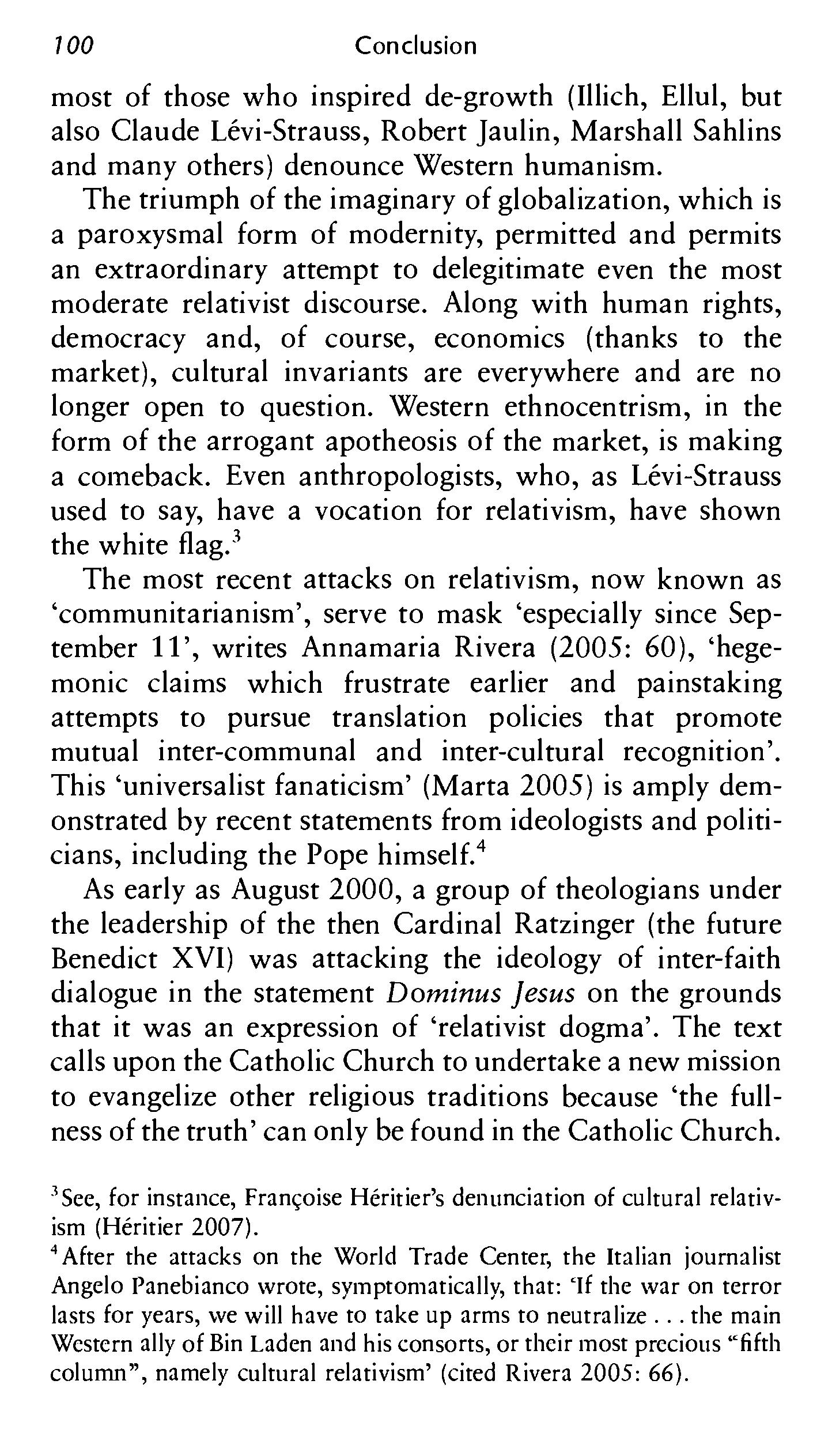
3See, for instance, Françoise Héritier's denunciation of cultural relativ- ism (Héritier 2007). 4After the attacks on the World Trade Center, the Italian journalist Angelo Panebianco wrote, symptomatically, that: 'If the war on terror lasts for years, we will have to take up arms to neutralize . . . the main Western ally of Bin Laden and his consorts, or their most precious "fifth column", namely cultural relativism' (cited Rivera 2005: 66).
This dogmatic stance destroyed the cross-cultural initia- tives of Vatican II and the admirable work of the Indian- Catalan theological Raimon Panikkar, who has devoted his whole life to developing a matrix for inter-faith and inter-cultural dialogue.
This universalist fanaticism is rightly denounced by Franco Cardini:
We are faced with the systematic construction of a new totalitarianism that demonizes as 'relativist' any form of life and thought that differs from that imposed by the dominant paradigm and which claims to have a monopoly on the quest for the good and this earth by expelling any other form of thought or religious, civil and social vision because it is 'barbaric' or 'tyrannical'.5 According to the Iranian Maryam Namzic, relativism is 'the fascism of our day' because it 'legitimates and fuels barbarism'.
It asserts that the rights of individuals depend upon their nationality, their religions and their culture... . The sup- porters of cultural relativism state that we must respect culture and religion, even when they are despicable. . . . The defenders of cultural relativism have no qualms about saying that universal rights are a Western concept.. . . They are the defenders of the holocaust of our age.6
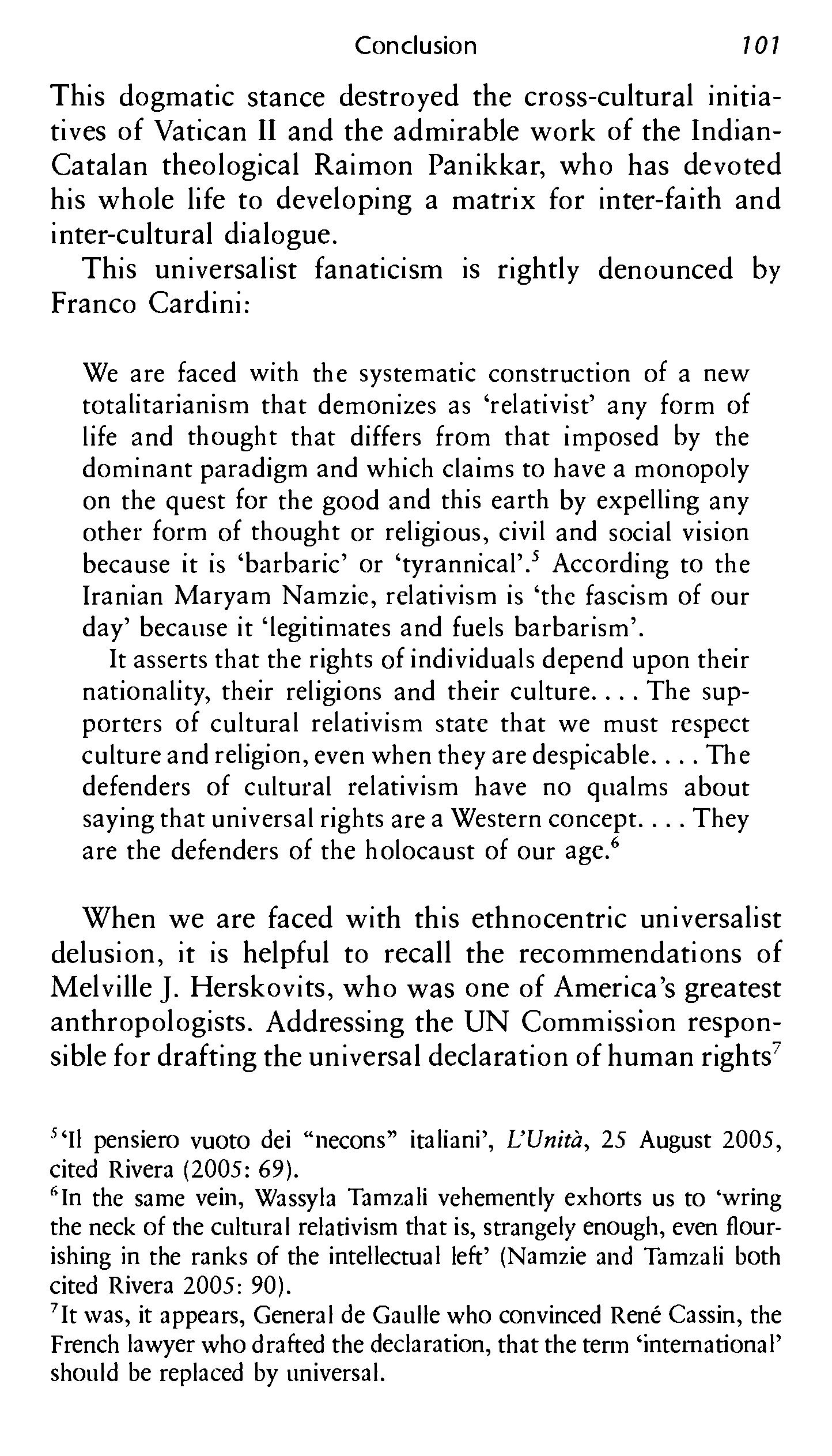
When we are faced with this ethnocentric universalist delusion, it is helpful to recall the recommendations of Melville J. Herskovits, who was one of America's greatest anthropologists. Addressing the UN Commission respon- sible for drafting the universal declaration of human rights7
'il pensiero vuoto dei "necons" italiani', L'Unità, 25 August 2005, cited Rivera (2005: 69). 61n the same vein, Wassyla Tamzali vehemently exhorts us to 'wring the neck of the cultural relativism that is, strangely enough, even flour- ishing in the ranks of the intellectual left' (Namzie and Tarnzali both cited Rivera 2005: 90). 71t was, it appears, General de Gaulle who convinced René Cassin, the French lawyer who drafted the declaration, that the term 'international' should be replaced by universal.
in his capacity as a member of the executive board of the American Anthropological Association in 1947, he made a preventive critique of universalism (that of universalist ideology, and not of the idea of universality). He argued that any attempt to formulate postulates derived from one culture's convictions or moral code made it more difficult to apply any declaration of human rights to humanity as a whole (cited Rivera 2005: 90). At the time, Herskovits' warnings and his demand for universality and plurality to be articulated went unheeded because of the fear that it might lead to a relativization of 'Nazi culture'. Islamism is the new spectre, and it is being used to justify the same refusal to contextualize human rights and to instrumental- ize the legitimate demands of the women who are forced to live under sharia law.
Perhaps we should, in a word, be thinking about replac- ing the universalist dream, cleansed of its terrorist or total- itarian overtones - including the imperialism of growth - with the need to recognize what the Creole writer Raphael Confiant calls 'diversality' or a 'pluriversalism' that is by definition relativist, or in other words a real 'democracy of cultures'. That is why the dc-growth project is not a turnkey model, but a source of diversity.
Having said that, we must make it quite clear that this conception of dc-growth is by no means an anti-humanism or an anti-universalism. Between the extremes of treating animals and things like people (as animists would) and treating people as things, as the modern techo-economy does, there is room for a respect for things, beings and people. Perhaps we could speak of an a-humanism, in the sense that I speak of a-growth. This certainly does not imply a rejection of all axiology, as my friend Michel Dias (2006) seems to think. On the contrary. It is not for nothing that the first 'R' in the virtuous circle that leads to dc-growth is 're-evaluate'. The values we need (altruism, conviviality, respect for nature) are also the values that will allow us to begin a dialogue with other cultures without destroying them in the same way as the arrogant universal-
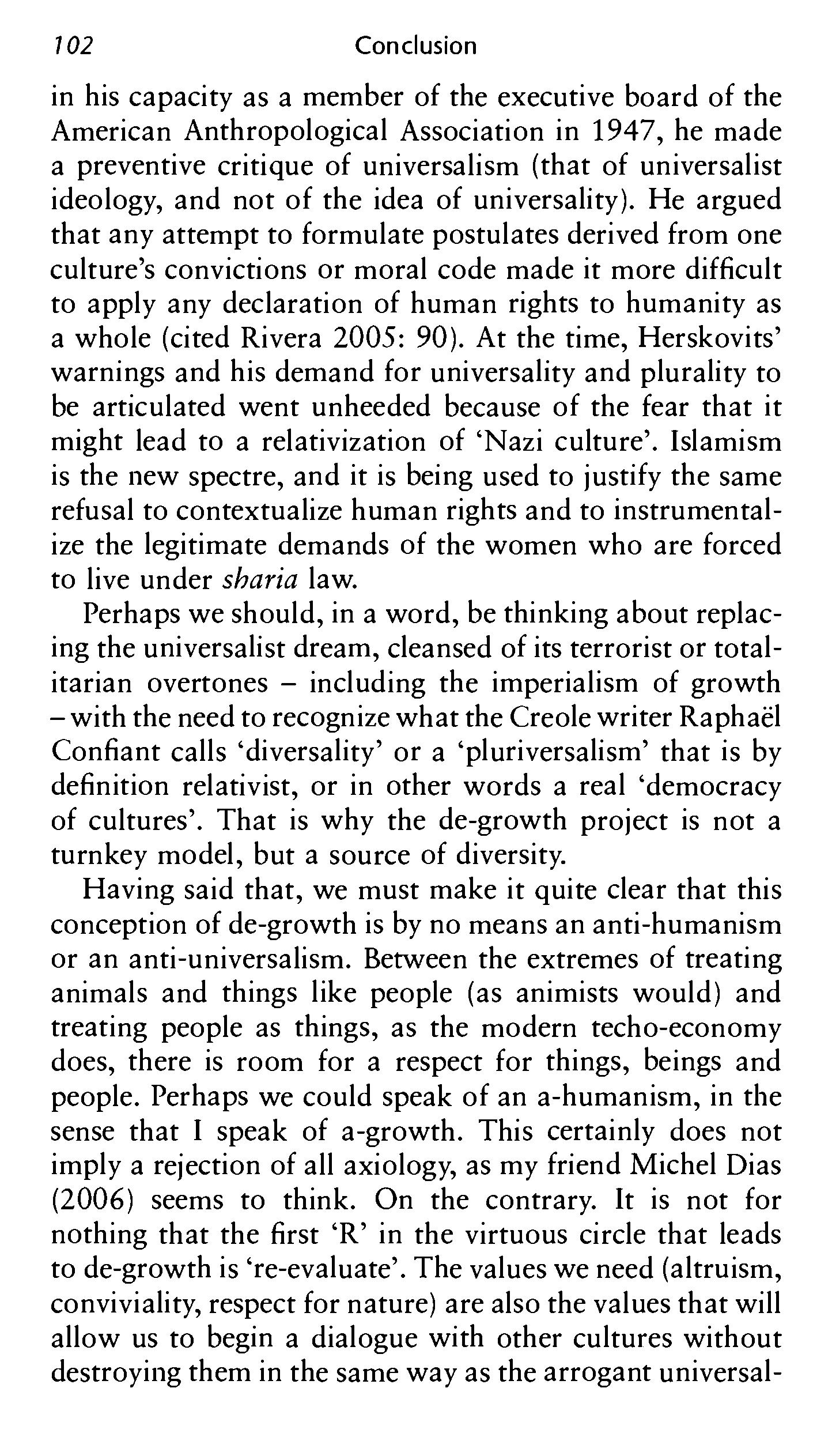
ism of a dominant power, because we agree to recognize the relativity of our own beliefs. I do not, however, make this an absolute principle, and I do not feel that I have the right to prevent a Hindu from regarding killing a cow as murder, not that that will prevent me from enjoying a good steak.
The critique of modernity does not imply that we must simply reject it; it means, rathei that we have to transcend it. We have to denounce its bankruptcy and the trium- phant heteronomy of the dictatorship of financial markets in the name of the emancipator project of the Enlighten- ment and the construction of an autonomous society.
Between the extremes of the blind or dogmatic anthro- pocentrism of Western modernity and the animist worship of nature, there is probably room for an eco-anthropocen- trism (see Lanternari 2003). The very survival of human- ity, and therefore of humanism in what we might call the true sense of that term, means that ecological concerns must be a central part of our social, political, cultural and spiritual preoccupation with human life. Recognizing that nature (animals, plants and everything else) has rights and fighting for 'eco-justice' and 'eco-morality' does not neces- sarily imply that we have to subscribe to the ecolatry of the new ecological cults or turn to the eco-feminist high priestesses of the syncretic neo-pagan and 'new age' cults that flourish all over the place to fill the emptiness in the soul of our aimless societies. Marxism is part of this tradi- tion, which is why Hans Jonas writes: 'For Marx, the humanization of nature is a hypocritical euphemism for the total submission of nature to man so that he can exploit it completely in order to satisfy his own needs' (cited Lanternari 2003: 330).
I have argued that creating a de-growth society inevita- bly involves a re-enchantment of the world (see the conclu- sion to Latouche 2006a). But we have yet to agree what that means. The disenchantment of the modern world is at once simpler and more profound than Max Weber's analysis might suggest. It has less to do with the triumph
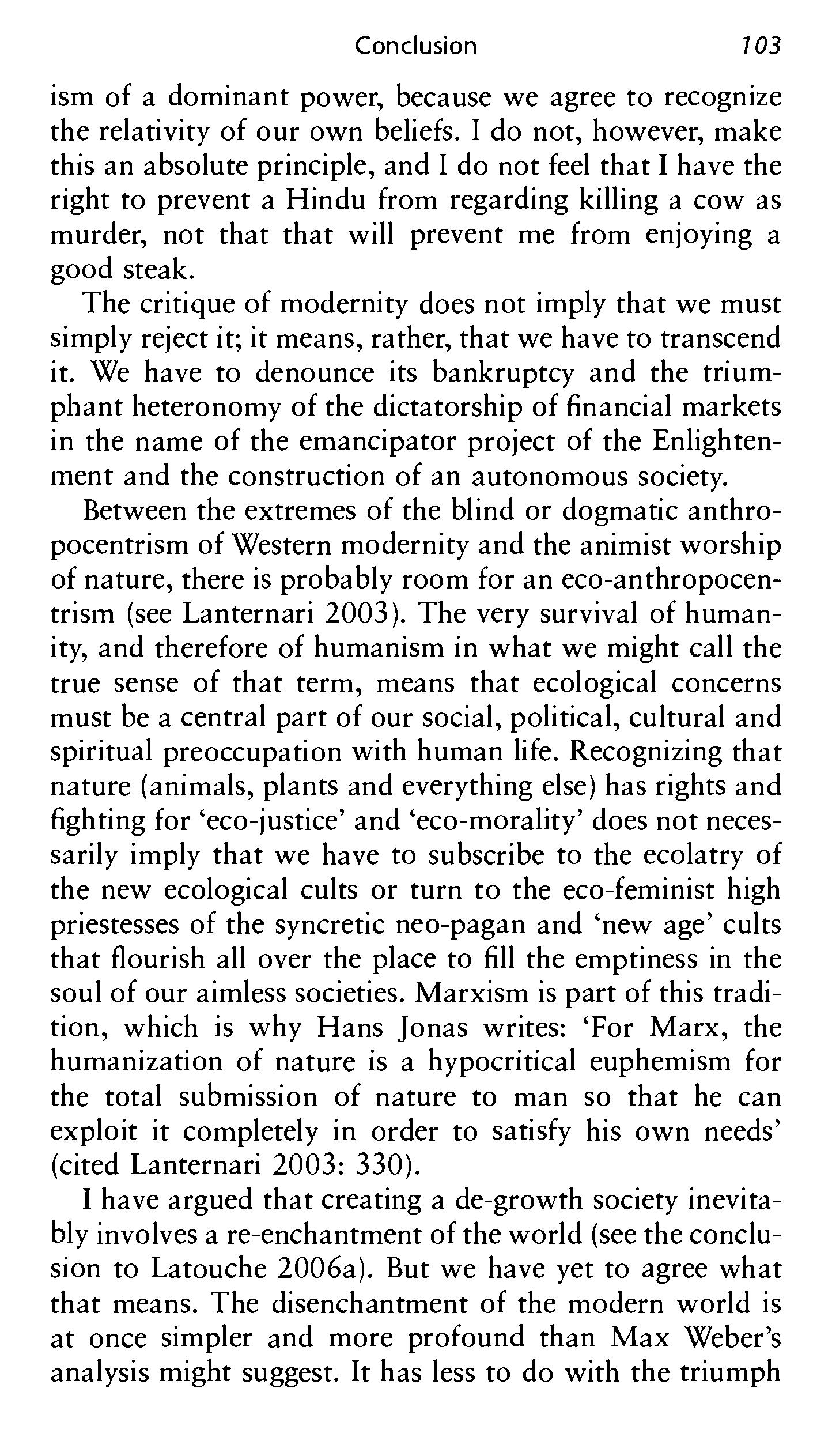
of science and the disappearance of the gods than with the fantastic banalization of the things produced by the thermo-industrial system. In that sense, it really is a disen- chantment and not just a 'demythologization'.8 The use of vast quantities of the fossil energy that is freely supplied by nature both devalues human labour and authorizes the endless predation of natural 'wealth'. The result is a bound- less artificial abundance that destroys all sense of wonder in the face of the gifts of the 'creator' and the creative abilities of human skill. The attempt to commercialize caribous in an Inuit community is a telling example (Godbout 2004: 420). The mayor of the village said to the government's spokesman:
You know, we've been living with the caribou for a long time now, and I am not sure that we can do that to them. . . . The trouble is that introducing the caribou into the spatialized commodity circuit means cutting them off from their temporal network and the history of their rela- tionship with the Inuit; we would have to turn them into objects, cut them into pieces and sell them, just as we do for the modern production process.
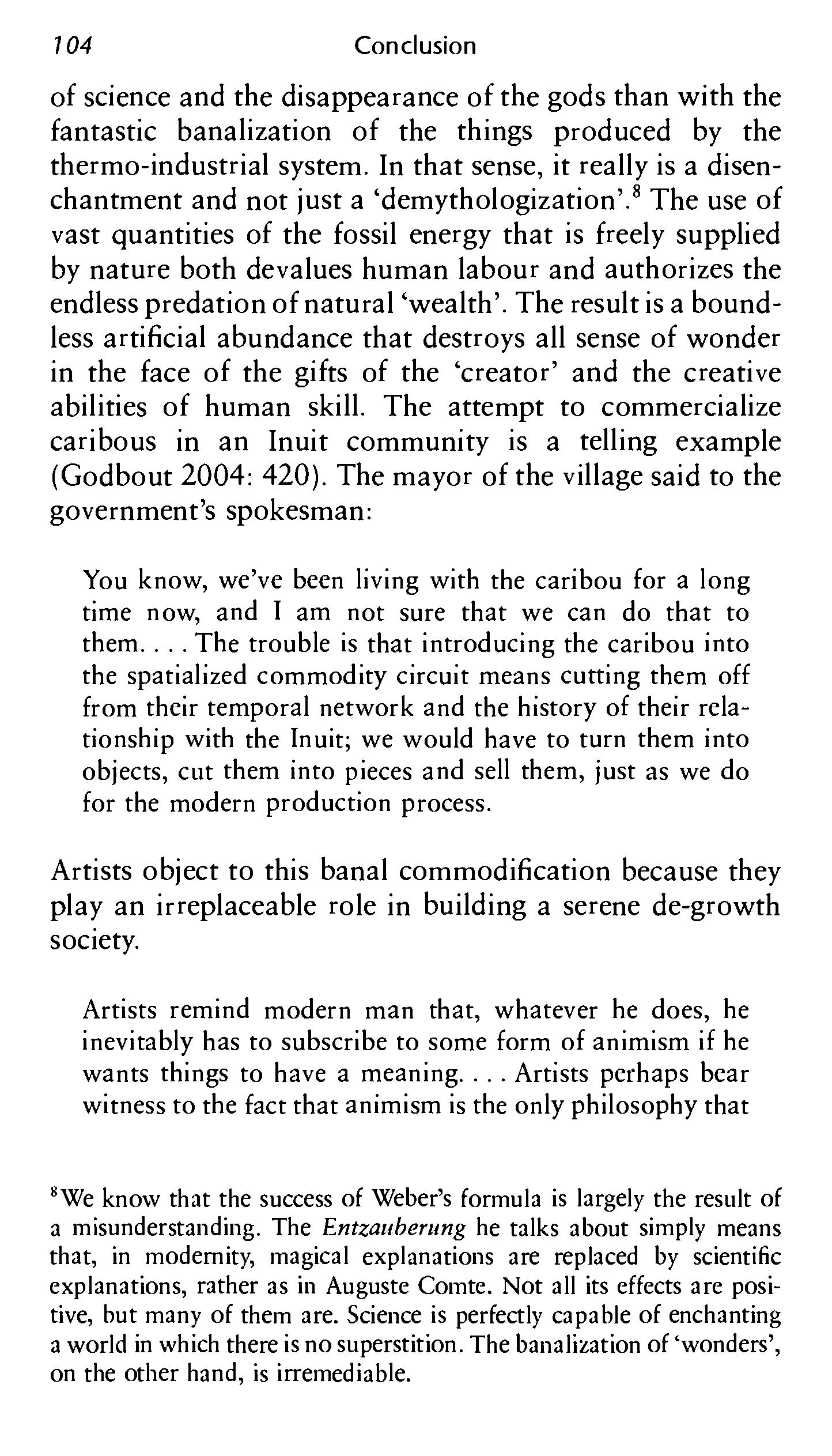
Artists object to this banal commodification because they play an irreplaceable role in building a serene de-growth society.
Artists remind modern man that, whatever he does, he inevitably has to subscribe to some form of animism if he wants things to have a meaning. . . . Artists perhaps bear witness to the fact that animism is the only philosophy that
8We know that the success of Weber's formula is largely the result of a misunderstanding. The Entzaiiberung he talks about simply means that, in modernity, magical explanations are replaced by scientific explanations, rather as in Auguste Comte. Not all its effects are posi- tive, but many of them are. Science is perfectly capable of enchanting a world in which there is no superstition. The banalization of 'wonders', on the other hand, is irremediable.
respects things and the environment; it is a philosophy that is adapted to the spirit of the gift that circulate in things, and modernity has Cut US off from that. (Ibid.)
Animism or no animism, in a de-growth society, as Oscar Wilde puts it, 'All art is quite useless' . . . and therefore essential.
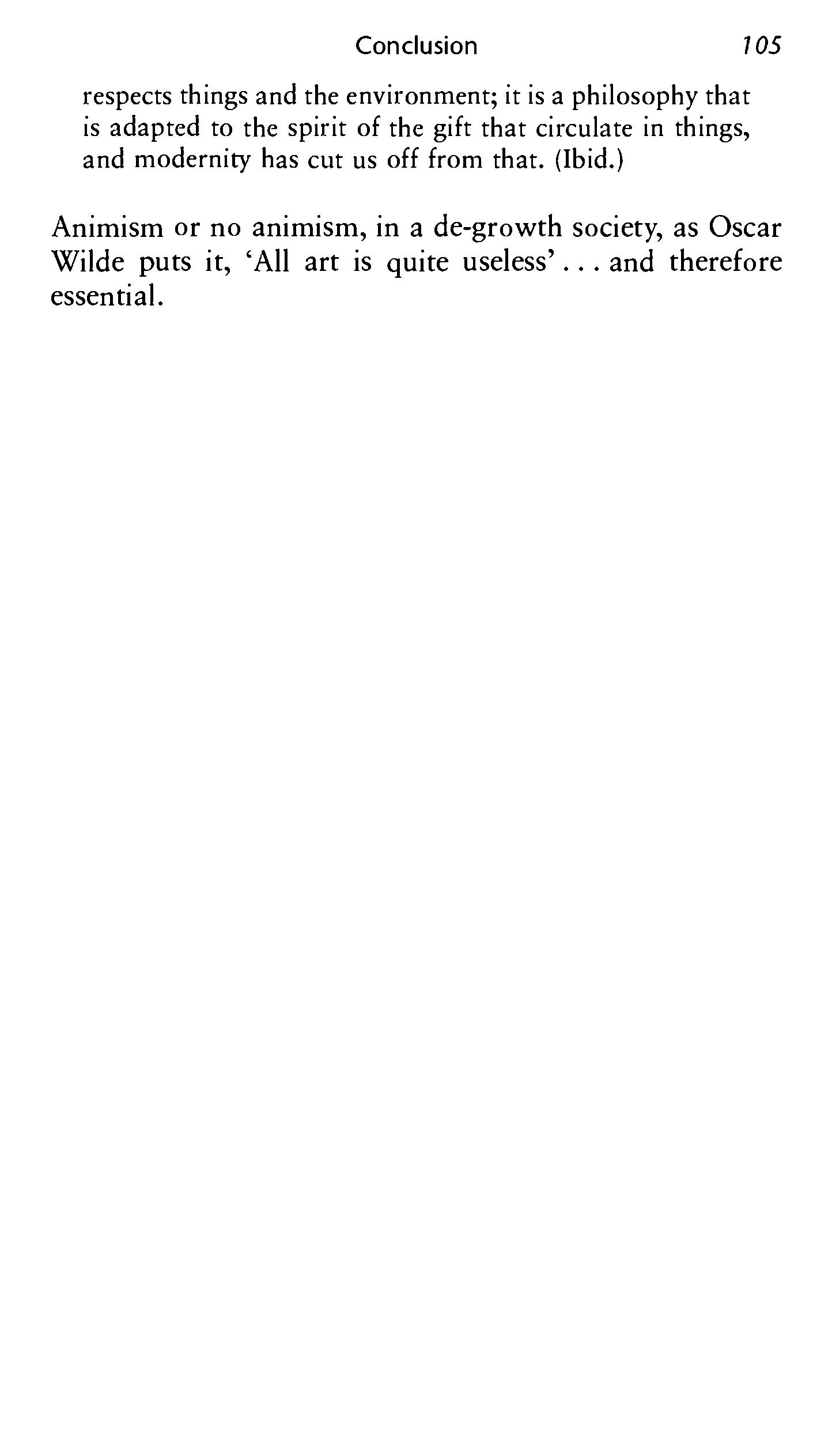
Bibliography
Aimé, Marco (2006), Gli specchi di Gulliver, Turin: Bollati. Allende, Salvador Goosens (1973), Speech Delivered by Dr
Salvador Allende, President of the Republic of Chile, Before the General Assembly of the United Nations, 4 December 1972, Washington, DC: Embassy of Chile. Ariès, Paul (2005), Décroissance ou barbarie, Lyon: Golias. Attac (2006), Pauvreté et inégalité, ces créatures du néolibéral- isme, Paris: Mille et une nuits. Attali, Jacques and Champain, Vincent (2005), 'Activité, emploi et recherche de l'emploi: changer de paradigme pour supprimer le chômage', Fondation Jean-Jaurès, no. 15, November. Auhertin, Catherine and Vivien, Franck-Dominique, eds (2006),
Le Développement durable. Enjeux politiques, économiques et sociaux, Paris: La Documentation française. Aubin, Jean (2003), Croissance: l'impossible nécessaire, Le
Theil: Planète bleue. Bailly, Emmanuel (2006), 'Le Concept de I'Ecorégion ou comment restaurer le système immunitaire des regions', Ligne d'horizon 36, AugustSeptember. Barras, Béatrice (2002), Moutons rebelles: Ardelaine, la fibre du développement local, Saint-Pierreville: Éditions Repas. Baudrillard, Jean (2005), 'Nique ta mère!', Libération, 18
November.
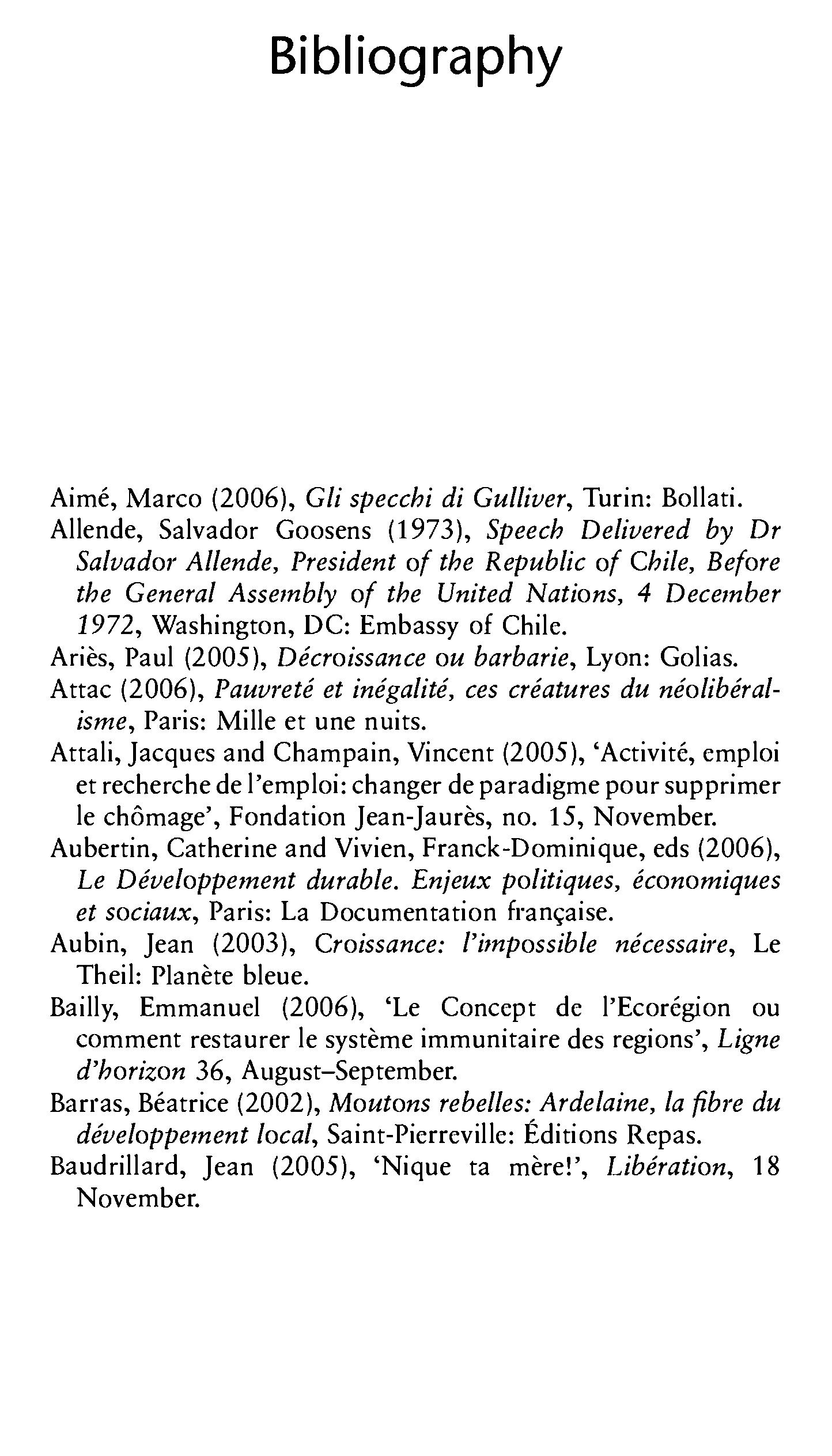
Bauman, Zygmunt (1998a), Globalization: The Human Conse- quences, Cambridge: Polity. (1998b), Work, Consumerism and the New Poor, Milton
Keynes: Open University Press. Baverez, Nicolas (2003), La France qui tombe, Paris: Perrin. Bclpommc, Dominiquc (2004), Ces Maladies créées par l'homme,
Paris: Albin Michel. (2007), Avant qu'il ne soit trop tard, Paris: Fayard. Berlinguer, Enrico (1977), Austerità. Occasione per trasformare l'italia (Le conclusioni al convegno degli intellettualie (Roma, 15-1-77) e all'assemblea degli operai coinmunisti (Milano, 30-1 -77), Rome: Editori Riunti. Berthouad, Arnauld (2005), Une Philosophie de la cosomma- tion. Agent économique et sujet moral, Villeneuve d'Ascq:
Presses universitaires du Septentrion. Besset, Jean-Paul (2005), Comment ne plus être progres- siste.. . sans devenir réactionnaire, Paris: Fayard Besson-Girard, Jean-Claude (2005), Decrescendo cantabile.
Petit manuel pour une décroissance harmonique, Lyon:
Parangon. Bevilacqua, Piero (2001), Demetra a Clio: uomini e ambiente nella storia, Rome: Donzelli. (2006), La Terra è finite. Breve storia dell' ambiente, Bari:
Laterz Biehi, Janet, with Murray Bookchin (1998), The Politics of
Social Ecology: Libertarian Municipalism, Montreal: Black
Rose Books. Blanc, Jérôme, ed. (2006), Exclusion et liens financiers,
Monnaies sociales, Rappport 2005-2006, Paris: Economica. Bloch, Ernst (1986) [1959J, The Principle of Hope, trans. Neville
Plaice, Stephen Plaice and Paul Knight, Cambridge MA, MIT
Press, three vols. Bologna, Gianfranco, ed. (2001), Italia capace di futuro,
Bologna: WWFEMI. Bonaiuti, Mauro (2001), La Teoria bioeconomica. La 'nuova economia' di Nicholas Georgescu-Roegen, Rome: Ed. Carocci. (2003), Nicholas Geroescu-Roegen. Bioeconomia. Verso un'altra economia ecologicamente et socialmente sostenible,
Turin: Bollati Boriinghieri. Bonesio, Luisa (2001), 'Une Réponse à la mondialisation', Elé- ments 100, March.
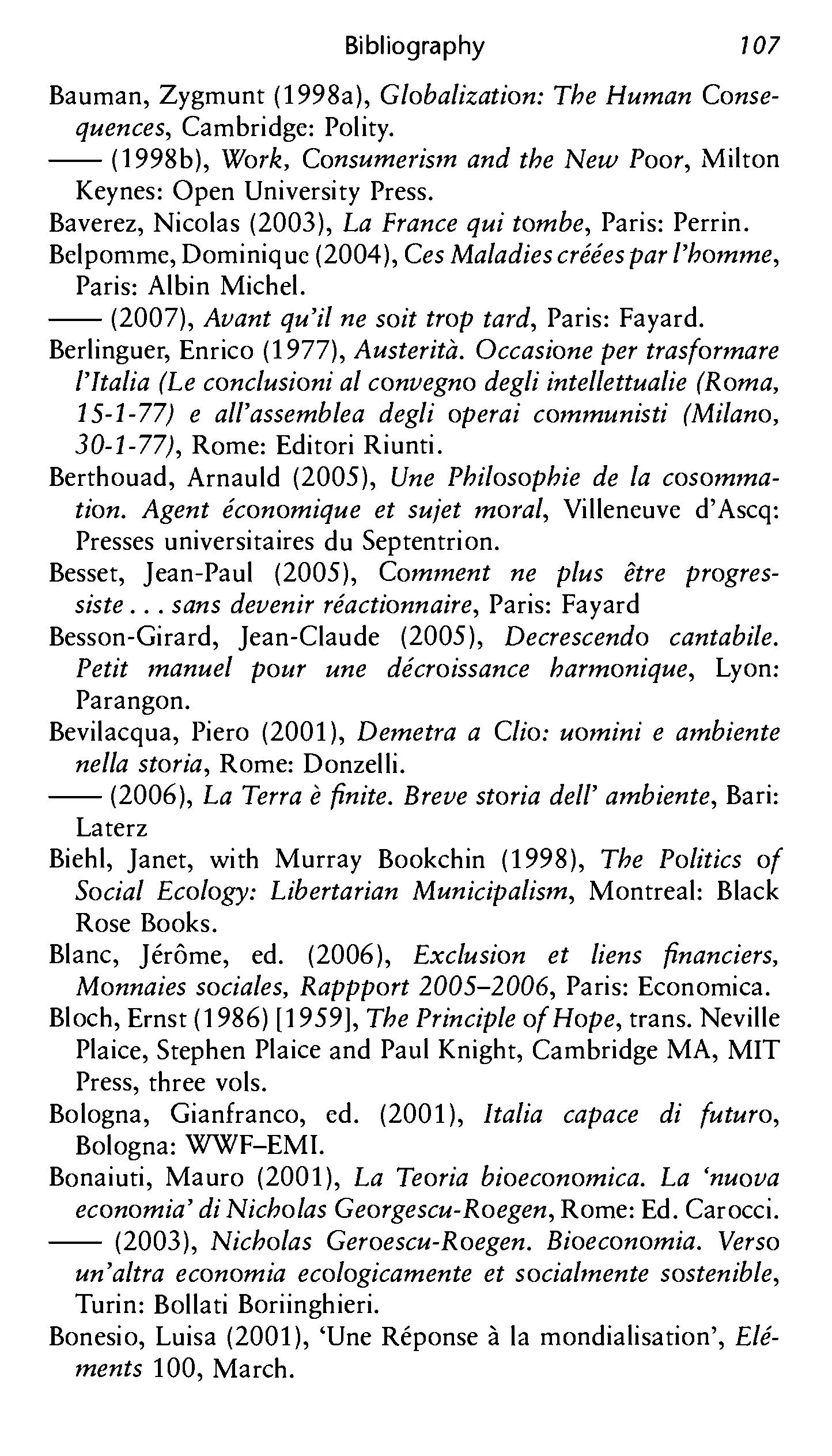
108 Bibliography Bonora, Paola, 'Sistemi locali territoriali, transcalarità e nouve regole della democrazia del basso', in Anna Marsoon, ed., Il
Progetto della democrazia di territrio nella città metro poli- tana, Florence: Almea editrice. Bookchin, Murray (1980), Toward an Ecological Society,
Montreal: Black Rose Books. (1982), The Ecology of Freedom. The Emergence and
Dissolution of Hierarchy (revised edn), Montreal: Black Rose
Books. (2001), 'Interview with Murray Bookchin' by David Vanek,
Harbinger, A Journal of Social Ecology 2(1). Boulding, Kenneth E. (1996) [1966], 'The Economics of the
Coming Spaceship Earth', in Victor D. Lippit, ed., Radical
Political Economy, Armonk, NY: M.E. Sharpe. Boyé, José (2007), Candidat rebelle, Paris: Hachette
Littératures. Brillat-Savarin (1970) [18251, The Philosopher in the Kitchen, trans. Anne Drayton, Harmondsworth: Penguin. Brown, Lester R. (2001), Eco Economy: Building an Economy for the Earth, London: Earthscan. (2003), Plan B: Rescuing a Planet under Stress and a
Civilization in Trouble, New York: Norton. (2004), Blueprint for a Better Planet, Hendersonville, NC:
Mother Earth News. Brune, François (2004), De L'idéologie aujourd'hui, Lyon:
Parangon. (2006), 'La Frugalité heureuse: une utopie', Entropia 1. Bruni, Luigino (2002), 'L'Economia e i paradossi della felicita', in Pier Lugui Sacco and Stefano Zamagni, eds, Complessita, relazionale e com paramento economica, Bologna: Il Mulino. Cacciari, Paolo (2006), Pensare la descrescita. Sostenilitià ed equità, Rome/Naples: Cantieri Carta/Edizione Intra Moenia. Caillé, Alain (2005), Dé-penser l'économie. Contre le fatalisme,
Paris: La Découverte and MAUSS. Canfin, Pascal (2006), L'Economie verte expliquée à ceux qui n'y croient pas, Paris: Les Petits Matins. Castoriadis, Cornelius (1966), La Montée de l'insignifiance: Les
Carrefours du labyrinthe 1V, Paris: Seuil. (English edn: Cross- roads in the Labyrinth, trans. Kate Soper and Martin Ryle,
Cambridge, MA: MIT Press. (2005), Une Société à la derive, Paris: Seuil.
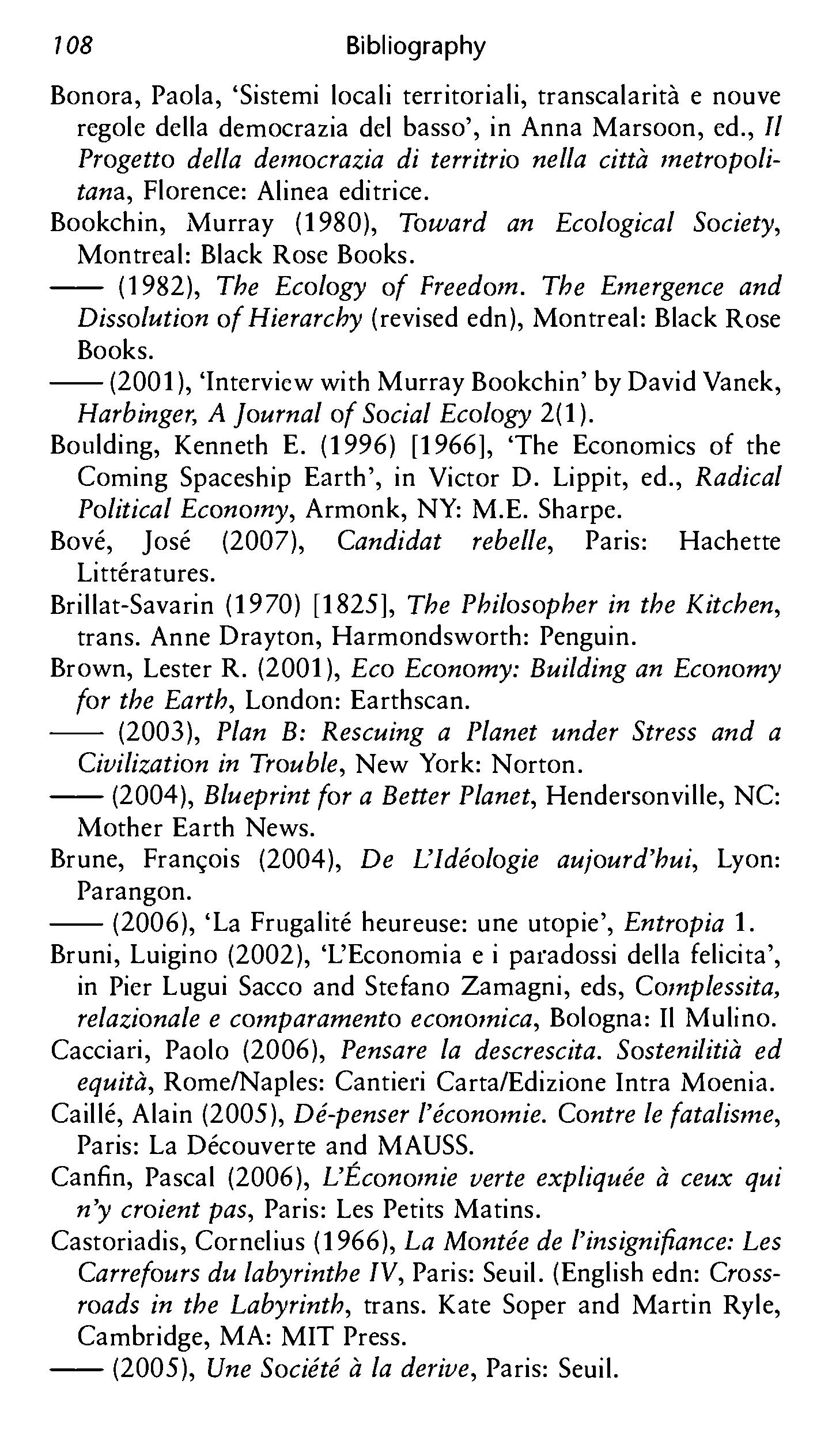
Chanial, Philippe (2006), 'Une Fois commune: démocratie, don et éducation chez John Dewey, Revue du MAUSS 28. Charbonneau, Bernard (1981), Une Seconde Nature, Pau:
Bernard Charbonneau. Charbonneau, Simon (n.d.), 'Résister à la croissance des grandes infrastructures dc transport', Working document. (2006), Droit communautaire de l'environnement, Paris:
L'Harmattan, revised and expanded edn. Cheynet, Vincent and Cheynet, Denis (2004), 'La Décroissance pour l'emploi', La Décroissance 3, July. Cicolella, André and Benoît-Browaeys, Dorothée (2005), Alertes santé, Paris: Fayard. Clément, Gilles and Jones, Louisa (2006), Une Écologie humaniste, Paris: Aubanel. Clerc, Denis (2006), 'Peut-on faire l'économie de l'environnement?', Cosmopolitiques 13. Cochet, Yves (2005), Pétrole apocalypse, Paris: Fayard. and SinaI, Agnès (2003), Sauver la terre, Paris: Fayard. Dahi, Robert A. (1983), Dilemmas of Pluralist Democracy:
Autonomy vs Control, New Haven: Yale University Press. Decrop, Geneviève (2007), 'Redonner ses chances à l'utopie',
Utopia 1. Dias, Michel (2006), 'Un Idéalisme politique', Entropia 1. Duclos, Denis (1997), 'Le Cosmocracie, nouvelle classe planétaire', Le Monde diplomatique, August. Dumazedier, Joffre (1967) [1962], Towards a Society of Leisure, trans. Stewart E. McClean, New York: Free Press. Dumouchel, Paul and Dupuy, Jean-Pierre (1979), L'Enfer des choses, Paris: Le Seuil. Dupuy, Jean-Pierre (2002), Pour un catastrophisme éclairé.
Quand l'impossible est certain, Paris: Le Seuil. and Robert, Jean 1976), La Trahison de l'opulence, Paris:
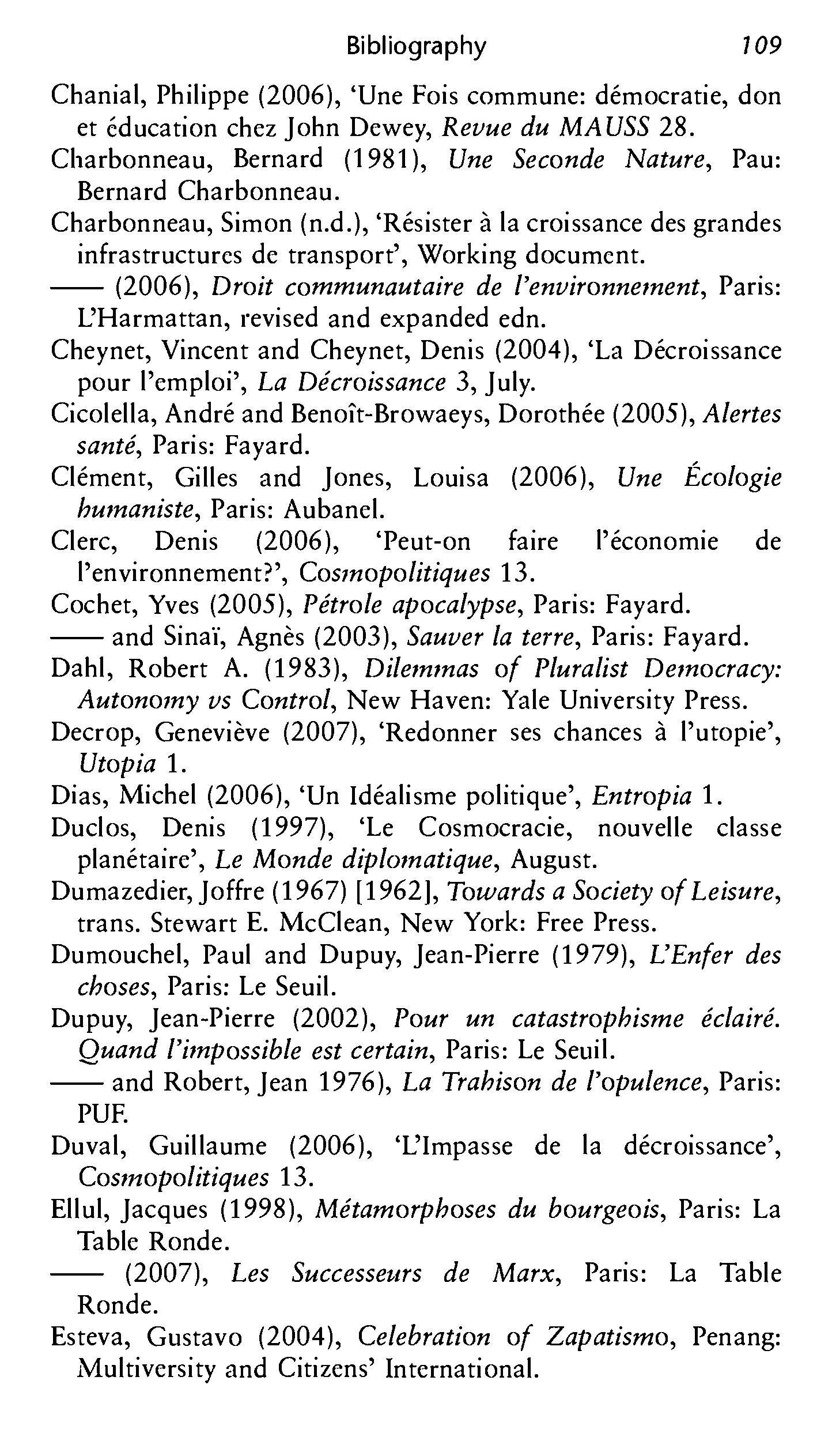
PUF. Duval, Guillaume (2006), 'L'Impasse de la décroissance',
Cosmo politiques 13. Ellul, Jacques (1998), Métamorphoses du bourgeois, Paris: La
Table Ronde. (2007), Les Successeurs de Marx, Paris: La Table
Ronde. Esteva, Gustavo (2004), Celebration of Zapatismo, Penang:
Multiversity and Citizens' International.
110 Bibliography and Prakash, M.S. (1998), Grassroots Postmodernism:
Remaking the Soil of Cultures, London: Zed Books. Flahaut, François (2005), Le Paradoxe de Robinson. Capital- isme et société, Paris: Mille et une nuits. Flipo, Fabrice (2007), Justice, nature et liberté. Les enjeux de la crise écologique. Lyon: Parangon. Fotopoulos, Takis (2001), Vers une démocratie générale. Une démocratie directe, économique, écologique et sociale, Paris:
Le Seuil. Galbraith, John Kenneth (1967), The New Industrial State, New
York: Houghton-Mifflin. Georgescu-Roegen, Nicholas (1971), The Entropy Law and the
Economic Process, Cambridge, MA: Harvard University
Press. (1994), La Décroissance: entropie, écologie, économie, intro, and trans. Jacques Grinevald and Ivo Rens, Paris: Sang de la terre. Gesualdi, Francesco (2005), Sobrietà. Dallo spreco di pocji ai diretti per tutti, Milan: Feltrinelli. Gevaert, Pierre (2005), Alerte aux vivants et à ceux qui veulent le reste, Commarque: Ruralis. Godbout, Jacques (2004), 'Les Conditions sociales de la création en art et en sciences', Revue du MAUSS, 24, Une Théorie sociologique générale est-elle pensable? Gorz, André (1977), Ecologic et liberté, Paris: Galilée. (1989) [1988 j, Critique of Economic Reason, trans. Gillian Handyside and Chris Turner, (1994) [1991], Capitalism, London: Verso. Socialism, Ecology, trans. Chris
Turner, London: Verso. Grandstedt, Ingmar (2006), Peut-on sortir de la folle concur- rence? Petit manifeste à l'intention de ceux qui en ont assez,
Paris: La Ligne d'horizon. Gras, Alain (2003), Fragilité de la puissance, Paris: Fayard. (2006), 'Internet demande de la sueur', La Décroissance 35, December. Grinevald, Jacques (2006), 'Histoire d'un mot. Sur l'origine de l'emploi du mot décroissance,' Entro pia 1. Guibert, Bernard and Latouche, Serge, eds. (2006), Antiproduc- tivisme, altermondialisme, décroissance, Lyon: Parangon. Harribery, Jean-Marie (2004), 'Développement durable: le grand écart', L'Humanité, 25 June.
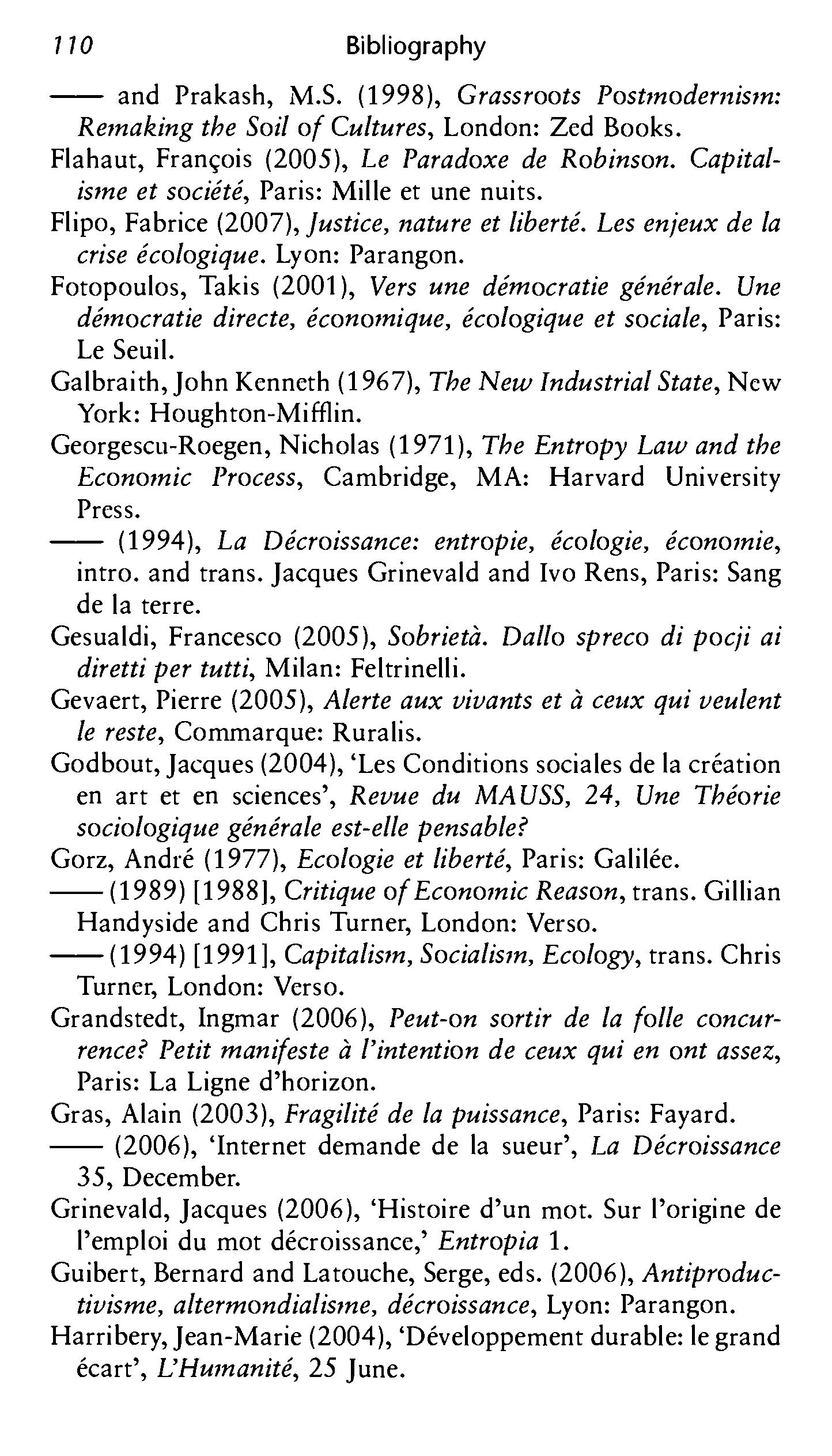
Héritier, Françoise (2007), 'La Femme comme question poli- tique', Le Soir (Brussels), 2 May. Hoogendijk, WilleIm (1991), The Economic Revolution.
Towards a Sustainable Future by Freeing the Economy from
Money-Making, Utrecht: International Books. (2003), 'Let's Regionalisc the Economy - and Cure Our- selves of a Host of Ills,' trans. Nigel Harle, Utrecht: Stichting
Aarde. (2005), Lets Stop Tsunamis, Utrecht: Earth Foundation. Hulot, Nicolas (2006), Pour un pacte écologique, Paris:
Calmann-Lévy. Illich, Ivan (1971), Deschooling Society, London: Calder and
Boyars. (1972), Tools for Conviviality, London: Calder and Boyars. (1973), Education without Schools, ed. Peter Buchan, with contributions from Ivan Illich, London: Souvenir Press. (1974), Energy and Equity, London: Calder and Boyars. (1977), Limits to Medicine. Medical Nemesis: The
Expropriation of Health, Harmondsworth: Penguin. (1983), Gender, London: Marion Boyars. Jacob, Jean (2006), L'Altermondialisation. Aspects méconnus d'une nébuleuse, Paris: Berg International. Jacquart, Albert (1998), L'Equation du nénuphar, Paris:
Calmann-Lévy. Jacquiau, Christian (2006), Les Coulisses du commerce équita- ble, Paris: Mille et une nuits. Jonas, Hans (1984) 11979], The Imperative of Responsibility: ¡n Search of an Ethics for the Technological Age, trans.
Hans Jonas with the collaboration of David Herr, Chicago:
University of Chicago Press. Jouvenel, Bertrand de (2002)119681, Arcadie. Essai sur le mieux vivre, Paris: Gallimard. Kempf, Hervé (2007), Comment les riches détruisent la planète,
Paris: Le Seuil. Kessous, Djémil (2006), La Révolution moderne (self-published). Kurz, Robert (2006), Critique de la démocratie balistique, Paris:
Mille et une nuits. Lafargue, Paul (1907), The Right to be Lazy, and Other Studies, trans. C.H. Kerr, Chicago: Charles H. Kerr & Co. Langlois, Bernard (2006), 'Bloc-notes', Politis, 14 December.
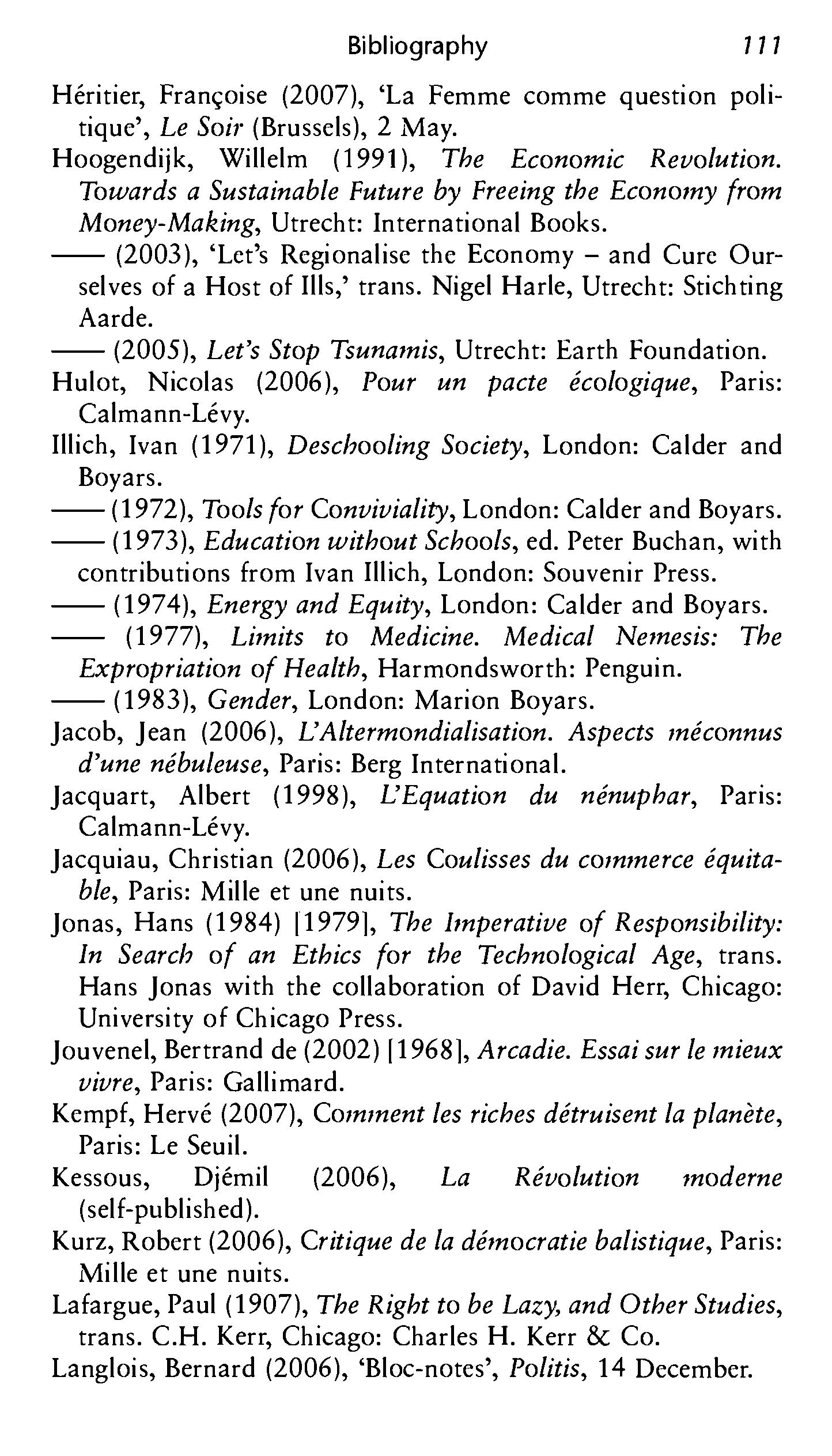
112
Bibliography Lanternari, Victor (2003), Ecoantropologia. Dall'ingerenza sociologica all svolta etico-culturale, Bans: Edizionie Dedalo. Latouche, Serge (1998), L'Autre Afrique. Entre don et marché,
Paris: Albin Michel. (2001), 'En finir une fois pour toute avec le développe- ment', Le Monde diplomatique, May. (2003a), Justice sans limites. Le Défi de l'éthique dans une économie mondialisée, Paris: Fayard. (2003b), 'Pour une société de décroissance', Le Monde diplomatique, November. (2003c), 'Il faur jeter le bébé plutôt que l'eau de bain',
IUED, Nouveaux cahier, no. 14: Brouillons pur l'avenir, contributions au débat sur les alternatives, avec ma réponse à
Christian Coméliau. (2003d), 'La Décroissance comme prélable et non comme obstacle à une société conviviale', unpublished conference paper, Lyon. (2004a), Survivre au développement. De la décolonisation de l'imaginaire économique à la construction d'une société alternative, Paris: Mille et une nuits. (2004b), 'Antiproductivisme, décroissance, développement dirable et post-développement', La Tourette, Centre Thomas
More, February. (2004c), 'Objectif décroissance: la croissance en question',
Campagnes solidaires 182, February. (2004d), 'Pédagogie des catastrophes', La Décroissance 1,
March. (2004e), 'La Décroissance, pourquoi?' Vert Contact 709,
April. (2004f), 'Contre l'éthnocentrisme du développement. Et la croissance sauvera le Sud. .. .', Le Monde diplomatique,
November. (2005a), L'invention de l'économie, Paris: Fayard. (2005b), 'À Foi irrationelle dans le progress balaie toute objection' (interview), CÍO Stratégie et technologie, March. (2005c), 'Sortir de l'impasse de "l'effet rebond"', Silence 322, ApriI. (2005d), 'Pour une renaissance du local', L'Ecologiste 14,
AprilMay. (2005e), 'Le Défi de la décroissance', Espace de liberté (Brussels) 331, May.

(2005f), 'La Décroissance comme condition d'une société conviviale', Cahiers Jacques Ellul 3. (2005g), 'Relocaliser l'économie', La Décroissance 28, September. (2005h), 'Entretien sur la décroissance', La Dynamo 37, September. (2005i), 'La Déraison de la croissance', A Bâbord 11, OctoberNovember. (2005j), 'Ecofascisme ou écodémocratie', Le Monde diplomatique, November. (2005k), 'Vivre simplement pour que d'autres, simplement, puissent vivre', (interview), Les Concentrés (Brussels), NovemberDecember. (20051), 'Politique de décroissance: vivre localement', Nature et progress 555, NovemberDecember. (2006a), Le Pari de la décroissance, Paris: Fayard. (2006b), 'Penser une société de décroissance. Entretien avec Emmanuelle Martin', Alliance pour une Europe des consciences 7. (2006c), 'La Decrescità', in Giovanna Ricoveri, ed., Capitalism, natura, socialismo, Milan: Jaca Book. (2006d), 'La Déraison de la croissance', L'Alpe (revue du Musée dauphinoise) 32. (2006e), 'Faut-il avoir peur d'abandonner la course à la croissance?' (interview), Alternatives non-violentes 138, March. (2006f), 'Entretien', Fibriles (Liège) 6, Spring. (2006g), 'Décroissance', in Sylvie Mesure and Patrick Savidan, eds, Le Dictionnaire des sciences humaines, Paris:
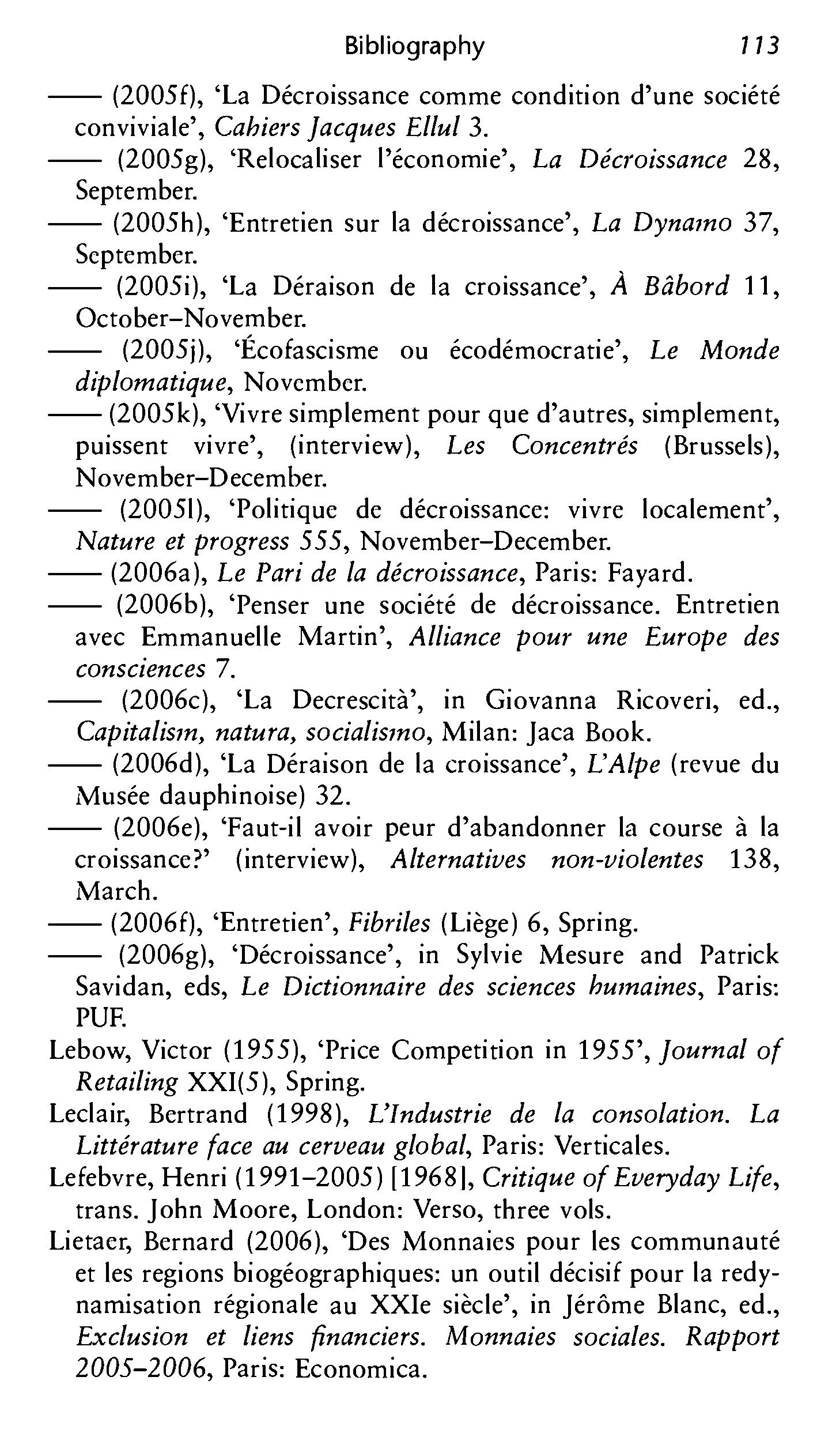
PUF. Lebow, Victor (1955), 'Price Competition in 1955', Journal of
Retailing XXI(S), Spring. Leclaii Bertrand (1998), L'Industrie de la consolation. La
Littérature face au cerveau global, Paris: Verticales. Lefebvre, Henri (1991-2005) [19681, Critique of Everyday Life, trans. John Moore, London: Verso, three vols. Lietaer, Bernard (2006), 'Des Monnaies pour les communauté et les regions biogéographiques: un outil décisif pour la redy- namisation régionale au XXIe siècle', in Jérôme Blanc, ed.,
Exclusion et liens financiers. Monnaies sociales. Rapport 2005-2006, Paris: Economica.
114 Bibliography Ligne d'Horizon (2002), Défaire de développement, refaire le monde (Actes du Colloque à l'UNESCO), Lyon: Parangon. Lipotevsky, Gules (2006), Le Bonheur paradoxal, essai sur la société d'hyperconsommation, Paris: Gallimard. Lord-Nicholson, David (2006), 'The Numbers Game', The
Ecologist, 22 September. Lulek, Michel (2003), Scions. . . travaillait autrement? Ambi- ance boi, l'aventure d'un collectif autogéré, Saint-Pierreville:
Editions Repas. Magnaghi, Alberto (2003), Le Projet local, Sprimont: Mardaga. Marson, Anna, ed. (2006), II Progetto di territorio nella città metropolitana, Florence: Almea editrice. Mansholt, Sico (1974), La Crise, Paris: Stock. Maris, Bernard (2006), Antimanuel d'économie. Tome 2: Les
Cigales, Paris: Bréal. Marta, Claudio (2005), Relzioni interetniche. Prospettive antro pologiche, Naples: Guida. Martin, Hervé-René (2007), Eloge de la simplicité volontaire,
Paris: Flammarion. Martin, Douglas (2006), 'Murray Bookchin, 85, Writer,
Activist and Ecological Theorist Dies', New York Times, 7 August. Martinez Aher, Joan (2004), 'Che cos'è I'economic ecologica', in Andrea Masullo, ed., Del mit della crecsita al nuvo umanesimo. Verso un nuovo modello di svilippo sostenibile,
Grottaminigarda: Delta 3 Edizioni. and Naredo, J.M. (1982), 'A Marxist Precursor to Energy
Economics: Podolonsky', Journal of Peasant Studies 9. Masullo, Andrea (1998), II pianeta di tutti. Vivere nei limiti perchè la terra abbia un futuro, Bologna. EM!. ed. (2004), Dal mito della crescita al nuovo unamensimo.
Verso un nuovo modello di svilluppo sostenihile, Grottami- narda: Delta 3 Edizioni. Meadows, Donella H., Randers,Jorgen and Behrens, W. (1972),
The Limits to Growth. A Report for the Club of Rome's
Project on the Predicament of Mankind, New York: Universe
Books. (1992), Beyond the Limits to Growth. An Update, Boston:
Chelsea Green. (2004), Limits to Growth. The 30 Year Update, Boston:
Chelsea Green.
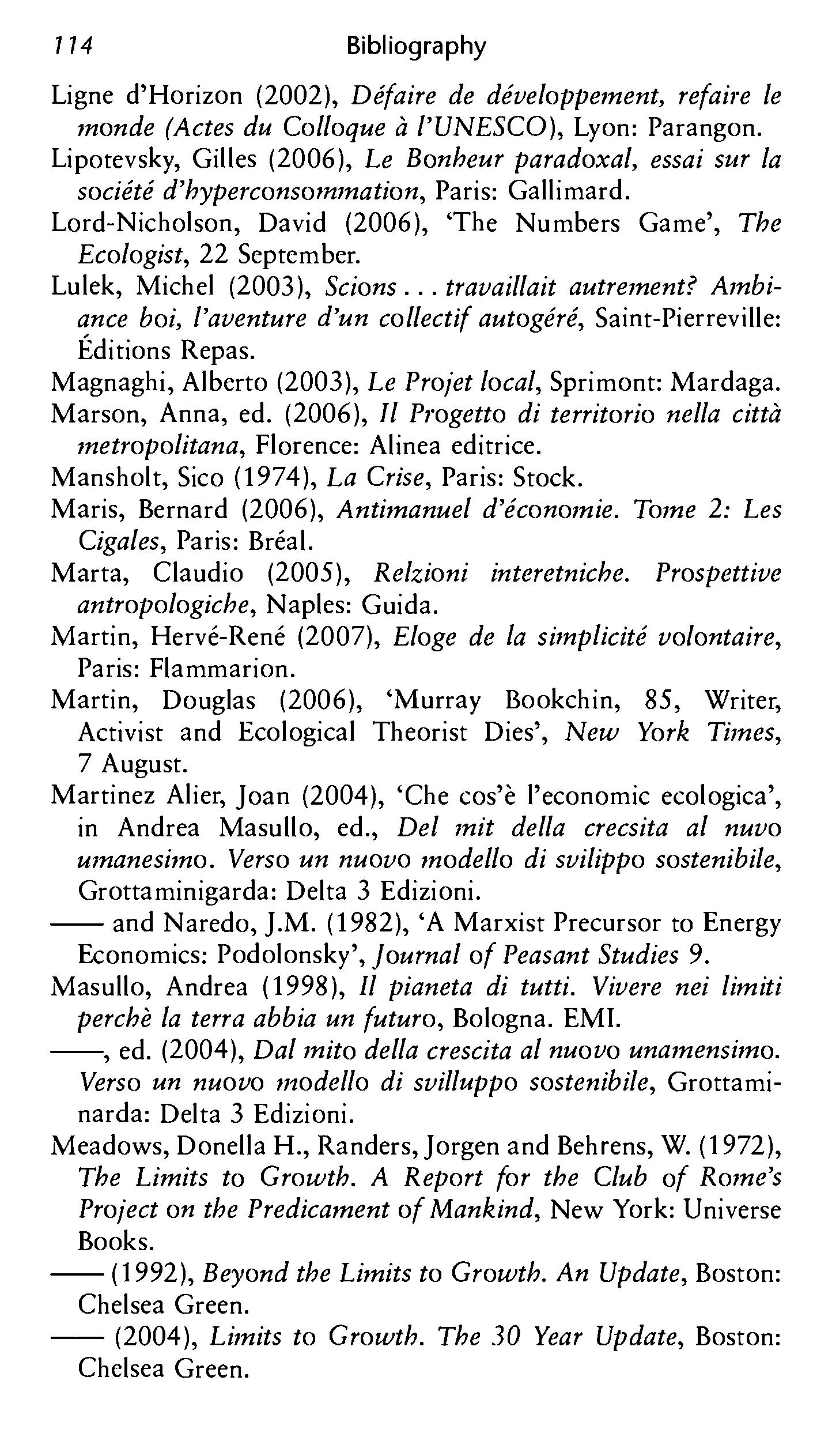
Méda, Dominique (1995), Le Travail, une valeur en voie de disparition, Paris: Alto-Aubier. (2001), 'Notes pour en finir vraiment avec la fin du travail',
Revue du MAUSS, 18. Meyei François (1954), Problématique de l'évolution, Paris:
PUE (1974), La Surchauffe de la croissance, Paris: Fayard. Mill, John Stuart (2004) [1848], Principles of Political Economy,
Amherst, NY: Prometheus Books. Monestier, Jean (2007a), 'Décroissance et travail', Entro pia 2. (2007b), 'La Grande Illusion des aéroports régionaux', Fil du Confluent 14, AprilMay. Mothé, Daniel (1977), L' Utopie del tempo libero, Paris: Esprit. Mühlstein, Philippe (2005), 'Les Ravages du movement perpe- tuel', Le Monde diplomatique, January. Mumford, Stephen D. (1996), The Life and Death of NSSM 200: How the Destruction of Political Will Doomed a US
Population Policy, Research Triangle Park, NC: Center for
Research on Population and Security. Napoleoni, Claudio (1990), Cercare ancora. Lettera sulla laicità e ultimi scritti, Rome: Editori Riunit. Narboni, Camilla (2006), Sulla incuria della cose: considerazioni fi los fiche sui rifiuti e sul mondo sacca heggiato, Pavia:
University of Pavia. Nicolino, Fabrice and Veillerette, François (2007), Pesticides, revelations sur un scandale français, Paris: Fayard. Pallante, Maurizio (2005), La Descrecita felice. La quantittà della vita no dipende dal PIL, Rome: Editori Riuniti. Panikkar, Raimon (2007), Pour un pluriversalisme, Lyon:
Parangon. Paquot, Thierry (2005), Eloge du luxe. De l'Utilité de l'inutile,
Paris: Bourin éditeui (2006), Terre Urbaine. Cinq défis pour le devenir urbain de la planète, Paris: La Découverte. (2007a), Petit manifeste pour une écologie existentielle,
Paris: Bourin éditeur. (2007b), Utopie et utopistes, Paris: La Découverte. Partant, François (2002), Que la crise s'aggrave, with a preface by José Boyé and an afterword by Serge Latouche, Lyon:
Parangon. Pasolini, Pier Paolo (2005), Scritti corsari, Milan: Garzanti Libri.
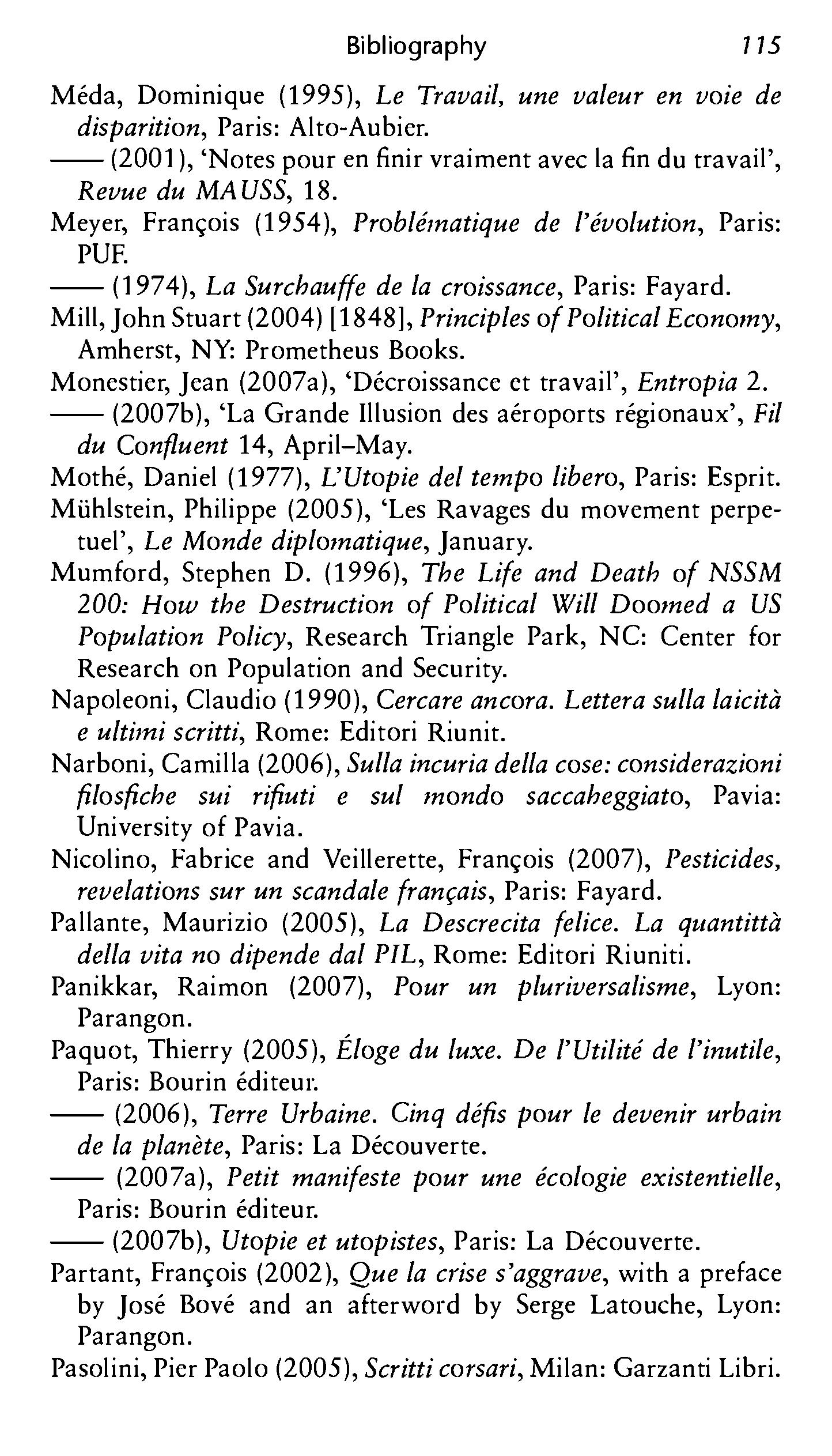
116
Bibliography Perrot, Marie-Dominique, DuPasquier, Jean-Noel, Joye,
Dominique, Leresche, Jean-Philippe and Rist, Gilbert, eds (2006), Ordres et désordres de l'esprit gestionnaire, Luzern:
Editions réalités sociales. Petrini, Carlo (2006), 'Militants de la gastronomie', Le Monde diplomatique, July. Prat, Jean-Louis (2007), Introduction à Castoriadis, Paris: La
Découverte. Rahnema, Majid (2003), Quand la misère chasse la pauvreté,
Paris: Fayard/Actcs Sud. Ramaux, Christophe (2006), Emploi: éloge de la stabilité. L'Etat social contre la flexicurité, Paris: Mille et une nuits. Rasmussen, Derek (2004), 'The Priced versus the Priceless' (www.cis.yale.edu/agrarianstudies/papersilorasinussen.pdf). Revel, Bernard (2005), Journal de la pluie et du beau temps,
Canet: Trabucaire. Ridoux, Nicolas (2006), La Décroissance pour tous, Paris: La
Découverte. Rifkin, Jeremy (1995), The End of Work: The Decline of the
Global Labour Force and the Dawn of the Post-Market era,
New York: Putman. Rist, Gilbert (2006), 'La Nouvelle Gestion publique peut- elle être social?', in Marie-Dominique Perrot, Jean-Noël
DuPasquier, Dominique Joye, Jean-Philippe Leresche and
Gilbert Rist, eds, Ordres et désordres de l'esprit gestionnaire,
Luzern: Editions réalités sociales. Rivera, Annamaria (2005), La Guerra dei simboli. Veli postco- loniali et retorich sull'alterità, Bari: Edizioni Dedalo. Robin, Jacques (1994), Quand le travail quitte la société post-industrielle, Paris: GRIT-édi teur. Rotillon, Gilles (2006), 'L'Economie de l'environnement définit un espace de négotiation rationnel,' Cosmo politiques

13. Rougemont, Denis de (1977), L'Avenir est notre affaire, Paris:
Stock. Ruffolo, Giorgio (2006), 'Crescita e sviluppo: critica e prospet- tive', Falconarai Macerata 8/9, November. Sachs, Wolfgang, ed. (1992), Development Dictionary: A Guide to Knowledge as Power, London: Zed Books. Sahlins, Marshall (1972), Stone-Age Economics, Chicago and
New York: Aldine Atherton.
Sas, Eva (2006), 'Conversion écologique de l'économie: quel impact sur l'emploi?', Cosmopolitiques 13. Singleton, Michael (2006), 'Le coût caché de la décroissance',
Entropia 1. Stern, Nicholas (2006), 'The Economics of Climate Change:
Exccutivc Summary' (www. sternreview-or. -uk). Tanguy, Philippe (2007), 'Pauvreté et cohesion sociale en
Mauritanie. Construction sociale et function d'une catégorie stigmatisante: la pauvreté', Revue Maghreh-Machreck 109. Tarde, Gabriel (1980) [1896], Fragment d'histoire future:
Geneva: Slatkine. Tertrais, Jean-Pierre (2006), Du Développment à la décrois- sance. De la nécessité de sortir de l'impasse suicidaire du capitalisme, Paris: Editions du Monde libertaire. Testart, Jacques (2006), Le Vélo, le mur et le citoyen. Que reste-t-il de la science?, Paris: Behn. Tévoédjrè, Albert (1979), Poverty: Wealth of Mankind,
Amsterdam: Elsevier. Tomkins, Richard (2006), 'Welcome to the Age of Less',
Financial Times, 10 November. Veblen, Thorstein (1970) [1899], The Theory of the Leisure
Class, London: Unwin Books. Traoré, Aminata (2002), Le viol de l'imaginaire, Paris: Actes
SudlFayard. Virilio Paul (1984), L'Espace critique, Paris: Galilée. (1995), La Vitesse de liberation, Paris: Galilée. Waal, Frans de (2005), Our Inner Ape: The Best and Worst of
Human Nature, London: Granta Wackernagel, Mathis (2005), 'Il nostro planeta si sta esaurendo', in Andrea Masullo, ed., Economia e ambient. La Sfida dei terzo millenio, Bologna: EMI. Wackernagel, Mathis, et al. (2002), 'Tracking the Ecological
Overshoot of the Human Economy', Proceedings of the
National Academy of Science USA 99(14). Worm, Boris, et al. (2006), 'Impacts of Biodiversity Loss on
Ocean Ecosystem Services', Science, November, vol. 314, pp. 787-90. WWF, Living Planet 2006 (http:llassets.panda. org/downloads! living_planet_report.pdf). Zanotelli, Alex (2006), Avec ceux qui n'ont rien, Paris:
Flammarion.
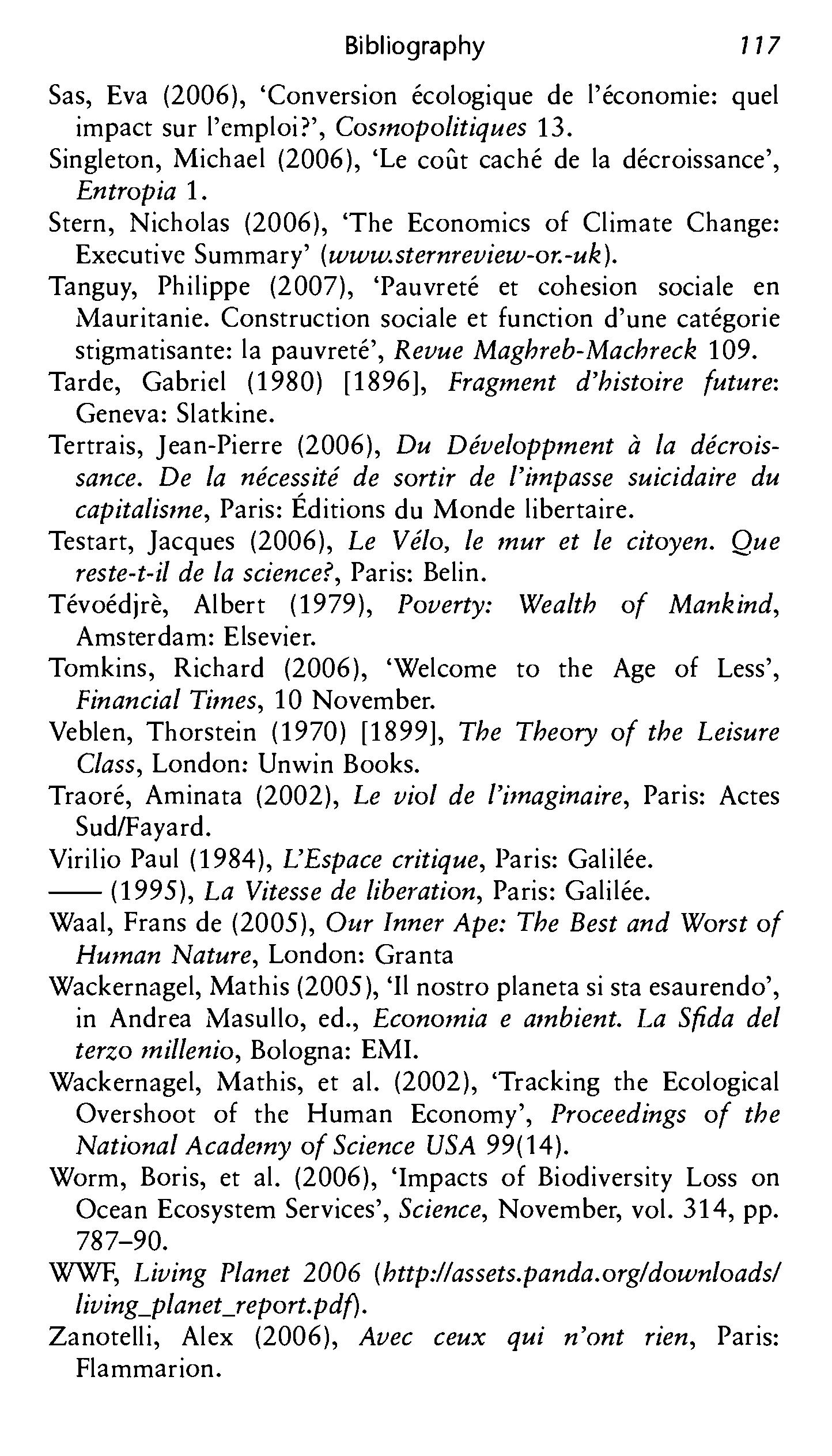
118
Bibliography Zin, Jean, 'Les Limites de la décroissance', La Décroissance,
January.
Journals and reviews consulted
Cahier de l'IUED 14: 'Brouillons pour l'avenir: contributions au débat sur les alternatives', Paris/Geneva: PUF, 2003. Campagnes solidaires (Mensuel de la confederation paysanne) 182, February 2004. Cosmopolitiques 13, 2006: 'Peut-on faire l'économie de l'evironnement?' La Décroissance. Le Journal de la joie de vivre, Casseurs de pub, 11, place Croix-Paquet, 69001 Lyon. L'Écologiste 8, October 2002; 14, October 2004; 20,
SeptemberNovember 2006. Entropia (Lyon: Parangon) 1, November 2006: 'Décroissance et politique'; 2, March 2007: 'Travail et décroissance'. Le Figaro, 24 March 2006. Libération, 8 February 2002; 18 November 2005; 14 December 2006. Ligne d'horizon 36, AugustSeptember 2006. Le Monde, 22 November 1991; 2 April 1996; 24 April 1999; 16 February 2002; 19 June 2003; 14 February 2004; 11 April 2004; 12 April 2004; 16-17 June 2005; 30 July 2006. Le Monde diplomatique, May 2001; July 2004; January 2005. Le Nouvel Observateur, 12-18 June 1972. Politis, 11 December 2003; 14 December 2006. Revue du MAUSS 24, 'Une Théorie sociologique générale est- elle pensable', 2nd quarter 2004. Science 280, February 2002: 'La Peur de la décroissance'; 302,
October 2003: 'Alternative-Alternative-Non-violence'. Vert Contact 709, April 2004.
